 21/07/2008 22:12 21/07/2008 22:12 |
|
| | | OFFLINE | | Post: 71 | Registrato il: 16/07/2007
| Utente Junior | |
|
Teresa,
It's not splitting hairs to regard the Orthodox as having churches and the Protestant communities as being "merely" ecclesial. The Orthodox have apostolic foundations, a legitimate episcopal lineage, a real sacramental system, etc., none of which the Protestants have.
Your idea that Benedict has not spoken "in his own person" on this issue is not correct. He spoke as Joseph Ratzinger in 1992 with Dominus Iesus and the CDF Response was also in his own voice. Dicasteries do not speak on their own, but in the name of the Pope, who signs each affirmation or document that is issued. The Pope was regarded as having spoken in his own voice when the document on seminaries and homosexuals was published in November, 2005. The same is true of the CDF Response. And Benedict's ecumenical priorities reflect this same hierarchy: the Orthodox, while not "sister churches" (cf. Tarcisio Bertone's statement, speaking FOR Cardinal Ratzinger from the CDF, when he was its Secretary) certainly are "churches," whereas the Reformation communities broke the link with their apostolic origins (in the person of the Pope, as the successor of Peter), redefined the sacraments, in some cases denied the Real Presence, abjured the authority of Rome, etc. |
|
 22/07/2008 04:44 22/07/2008 04:44 |
|
| | | OFFLINE | | Post: 14.416 | Registrato il: 28/08/2005
| Utente Gold | |
|
Dear Janice -
I have no idea what brought on this revisiting of this issue. I've said what I have to say on it. I don't expect everyone to share what I think - that's not the reason I express myself. You have your opinion and I have mine. That's all.
* * * * * * * * * * * * * * * * * * * * * * * * * * * * * * * * * * * * * * * * * * * * * * * * * * * * * * * *
    
[Modificato da TERESA BENEDETTA 22/07/2008 21:52] |
 22/07/2008 19:53 22/07/2008 19:53 |
|
| | | OFFLINE | | Post: 14.421 | Registrato il: 28/08/2005
| Utente Gold | |
|
  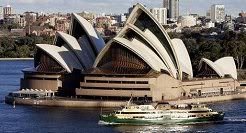 Don't forget you can always see the latest videoclips on the Holy Father here:
www.radiovaticana.org/it1/videonews_ita.asp
In the absence so far of a truly good appreciation of Benedict XVI post-WYD in the Australian press, forgive me for re-posting a recent article which is the kind of writing one hopes to find more often in MSM, by someone who can buck MSM's prevailing herd mentality. I have also added two other articles written for WYD but significantly relevant beyond WYD.
The young lead the way
Don't forget you can always see the latest videoclips on the Holy Father here:
www.radiovaticana.org/it1/videonews_ita.asp
In the absence so far of a truly good appreciation of Benedict XVI post-WYD in the Australian press, forgive me for re-posting a recent article which is the kind of writing one hopes to find more often in MSM, by someone who can buck MSM's prevailing herd mentality. I have also added two other articles written for WYD but significantly relevant beyond WYD.
The young lead the way
by Christopher Pearson

July 12, 2008
Christopher Pearson is an Australian journalist who writes for The Australian. He is currently a member of the Council of the National Museum of Australia and a member of the Board of the government-owned SBS television station. He served as a speech writer to former Prime Minister John Howard, Kevin Rudd's immediate predecessor.
Pearson writes commentaries and articles that cover a wide variety of cross- cultural & religious matters pertaining to Australian society. He has on occasion turned his pen toward more more international issues such as Global Warming, a matter over which he is highly critical. After this article, Pearson also wrote 'Pell war a cardinal shame' unmasking the machinations of anti-Church elements led by the Australian Broadcasting Corporation to try to steal the thunder from WYD and the Pope with drummed-up stories on priestly offenses..
FOR some of the pilgrims to World Youth Day, the new friendships they strike up will be the highlights of the event. For others, it will be the travel or events on the program such as the choral workshops or more inspiring preaching than they're used to at home.
But for most, the presence of the Pope is the main attraction.
Three years ago it would have been hard to credit. At that time Benedict XVI was generally regarded as a reserved, rather formal figure; a scholar rather than a pastor. However, even his fiercer critics now concede he has grown in the office and that the PanzerKardinal formerly charged with enforcing theological orthodoxy has come to project great personal warmth.
It was thought that he could never compete with the theatrical panache and crowd-pulling capacity of John Paul II. It turns out that Benedict is a mesmerising speaker who takes the trouble to convey complex ideas using simple language. His weekly Wednesday audiences regularly draw even larger numbers than those of his predecessor.
He has other attributes that particularly attract young people, irrespective of whether they're Catholics. Like the Dalai Lama, his presence is such that the courtesy title "His Holiness" doesn't generally strike them as misplaced. He's also grandfatherly without being in the least condescending, interested in them and constantly assuring them that they're capable of great things.
The Pope understands the constants in human nature. He knows that each rising generation - however defensive about admitting the fact - has a kind of spiritual hunger, the need for a sense of the numinous. It is widely regarded by neuro-scientists as hardwired in the brain, though most of them deplore the fact.
In part, it's wanting a sturdy worldview to underpin the intimations of order and beauty in nature. In part, it's craving reassurance that suffering and death are not what they seem.
Religious hope springs eternal. In Australia, for example, the current crop is without doubt the most inadequately catechised in seven generations, but they'll turn up in droves to see and hear him.
Bizarre new age cults may have become so popular that some sections of Australian Catholicism are reinventing themselves along pagan lines and junking core beliefs and traditions in the quest for relevance.
Yet CDs of monks singing Gregorian plainchant turn up regularly at the top of the charts, because the music reaches the hearts of thousands who've scarcely darkened a church door.
The Pope recognises that most young people still aspire to lead a moral life, to be faithful spouses, loving parents, to enjoy the trust and affection of their friends and workmates. He sees them as more often capable than their elders of rising above the snares of consumerism. They're apt to pay closer attention to his warnings about selfishness and his encouragement of high ideals.
Another thing the Pope instinctively grasps is that man is a ritual animal. Unlike many modern clerics, he sees that rituals that are supposed to enact supernatural truths have a radically different character from the rites of ordinary sociability.
A fortnight ago, in a live-streamed sermon to the Eucharistic Congress in Canada, he startled many of the clergy present by flatly contradicting what they'd been teaching since the late 1960s. He said: "The mass is not a meal among friends. It is a mystery of the covenant."
The fundamental problem in Catholicism's 40 years in the wilderness has been the erosion of a sense of the sacred. As the church itself began to lose confidence in the real presence of Christ in the Eucharist, it began to look for less demanding and more contemporary ways of construing the mass.
Belief in a bloodless but nonetheless material re-presentation of the sacrifice of Calvary and the mysterious transubstantiation of the bread and wine were thought too much to expect of baby boomers and in any case an alarmingly large percentage of clergy had come, more or less openly, to doubt it all.
A community meal, a function where the congregation's presence is seen as in itself incarnating the body of Christ, seemed so much more modern and plausible, planing down the supernatural to mere metaphor. The Pope calls these self-preoccupied celebrations, devoid of their proper focus, "parish tea-party liturgies".
American commentator Amy Welborn, has referred to them in comparably scathing terms as manifestations of "The Church of Aren't We Fabulous!".
The Pope has no objection to tea parties, of course, but in their proper place, rather than around a high altar. His principal reforms in the past three years have been concentrated on the liturgy and church music.
Many of the World Youth Day pilgrims will be young or youngish people who've grown up in bleak, modern churches devoid of careful ritual or the canon of sacred music. They know from the Catholic blogosphere that he's trying to recover the sacramental theology, along with the beauty and inspiration, that traditionally characterised worship and it's a project a lot of them consciously support.
Before turning to some of the recent reforms, there are a few points to be made about the overall project. To liberal-minded clerics, the prospect of young Catholics who are keen as mustard about the classic Latin rite or the "reform of the reform" push, who want the newer rite celebrated with greater solemnity and traditional music, can seem very threatening.
They're inclined to assume that the kids have signed on to a package deal involving a wholesale rejection of the Second Vatican Council, doubts about the legitimacy of any Pope since Pius XII, a return to the aridity of 1910-style Thomism, political ultra-conservatism and much else besides.
In fact, one of the noteworthy things about the youthful devotees of the old rite - who in Australia border on being the majority of its adherents - is that they mostly come without the cultural and ideological baggage associated with older die-hard traditionalists.
Many say they come for the sake of a more reverent atmosphere, or for the ritual silences that aid concentration or just for a mass done strictly by the book, with no novelties or abuses. That is to say, they take the liturgy itself as a given but that's all. A higher percentage were home-schooled but very few of them, for example, are likely conscripts to the right wing of the NSW Liberal Party, let alone neo-Hansonites in the making.
Gradually the Pope has been restoring Gregorian chant and Renaissance polyphony to pride of place in papal liturgies in Rome, despite the uncooperative attitude of the Sistine Chapel Choir. Distinguished composers of the recent past, such as Bruckner and Messiaen, are also restored to favour.
It would be nice to be able to announce that the era of soft Italian pop and 1960s kitsch is almost over. Alas it's not true, because the leading exponents are well entrenched. However, the Pope's own standards, especially those that can be observed on television broadcasts, set the overall tone for the rest of the church.
WYD tends to bring out the very worst in baby boomer musicians and liturgists hell-bent on designing celebrations according to their own preferences and, in a sense, in their own image. A great many lapses of taste and judgment are par for the course, usually justified on the grounds that "it's what young people want".
Whatever the compromises in store at Randwick racecourse, there is one recent reform in papal liturgies that will provide an edifying example next Sunday. The Pope has long argued that, for the laity, receiving communion kneeling rather than standing and on the tongue rather than in the hand is more fitting and conducive to devotion.
It will come as news to most Australian Catholics but the older practice is still normative. On the feast of Corpus Christi, some weeks back, his new master of ceremonies announced that it would once more be the normal mode in which the Pope would personally administer the sacrament.
At Randwick, we can expect to see a kneeler for Benedict's communicants and a precedent set for the millions who will be watching the broadcast.
[And certainly none of us anticipated the introduction at Randswick of those stunning moments of silence after the homily and Communion! I timed them during the Mass replays - each lasted at least two minutes long, not the perfunctory 15 seconds usually given to such public 'moments of silence'.
The innovation builds on the highly successful conversion by Pope Benedict in Cologne of the WYD vigil, which used to be what the MSM call a Catholic Woodstock - a fun-and-music fest - into a Eucharistic vigil. Hundreds of thousands of young people together can and do fall silent as an expression of worship and focus on the Lord. [The word that immediately comes to my mind is the Itlaian word for meditation, 'raccoglimento' - which is literally a gathering together of oneself, with the logical connotation of then offering it up to God.]
Nor would I call the resulting liturgy we experienced in Randwick 'compromise' at all, but rather an illustrative and felicitously successful synthesis of what Benedict XVI meant in Summorum Pontificum by a mutual enrichment of the two forms of the Roman rite. A much more seamless synthesis, I thought, than the New York Masses of the papal visit, as admirable as those were. Plus, Randwick also featured the incorporation of Latin for the more familiar prayers (including the Angelus after the Mass).
One Stateside blogger has noted that even the Mass parts sung by the choir consciously used the Latin words alongside the English. This was a feature that had also struck me forcefully - and happily - in the Mass parts sung at the much-maligned Nationals Stadium Mass in Washington (but no one else seemed to notice that, in the all-but-unanimous sweeping dismissal of its American-musical-history eclecticism).
Also, except for a questionable 'blues' number by a female singer during Communion, there was no concession at all to pop music in the Randwick Mass. No room within the Mass (rightly, I thought) even for the WYD08 anthem, 'Receive the power' - which is, after all, meant to be a pop 'mating call' (in the general sense) among WYD participants, not a sacred song.
 Here is a secular view on a particularly regrettable if not reprehensible aspect of secularism which he calls by its right name - sectarianism, and puts a few Catholic-bashing Australian journalists in their place.
The sorry sport of Pope bashing
Here is a secular view on a particularly regrettable if not reprehensible aspect of secularism which he calls by its right name - sectarianism, and puts a few Catholic-bashing Australian journalists in their place.
The sorry sport of Pope bashing
by Gerard Henderson

July 15, 2008
Henderson is executive director of the Sydney Institute, a privately funded not-for-profit current affairs forum devoted to encouraging debate and discussion. The Institute conducts about 60 policy forums a year on a wide range of issues with national and international figures as featured speakers.
The new sectarianism is quite different from the old sectarianism. Yet it is real enough. From European settlement in 1788 until about the mid 1960s, Australia was afflicted with a prevailing distrust of Catholics - many were of Irish descent - who formed the nation's largest minority. In those days sectarianism was essentially driven by Protestants.
Not any more. As the visit of Pope Benedict demonstrates, the non-Catholic Christian churches have either been welcoming to the Pope or indifferent in his presence.
Nowadays sectarianism in Western democracies is fuelled by what Michael Burleigh terms the "sneering secularists". In his book Sacred Causes Burleigh writes that "much of the European liberal elite regard religious people as if they come from Mars" except when they advance such left-liberal fashionable causes as nuclear disarmament.
The sneering secularists in our midst oppose all the Judeo-Christian beliefs. However, Catholicism cops much of the ridicule because it is universal and the strongest of the Christian faiths.
In Australia the sneering secularists - a combination of proselytising atheists and Green Left Weekly reading leftists - have indicated their opposition to the Pope on the occasion of his visit to Australia for World Youth Day. Hence the formation of the NoToPope Coalition.
So far the award for the leading sneerer goes to The Age columnist Catherine Deveny. Writing on June 18, she declared: "It's official. The Catholic Church is fully sick. And so is George Pell."
Apparently this was some kind of joke. She depicted World Youth Day as a "week of prayer, trust exercises and rosary bead trading". And Deveny went on to advise that, since the Pope will be celebrating Mass at Randwick racecourse, "all the Bernadettes and Gerards will be able to chill out with The Main Dude". It is inconceivable that The Age would have run a similar article mocking Islam and slagging off all the Aishas and Muhammads.
Although a professing agnostic, I was brought up a Catholic and attended a Catholic school where I received a fine education. Like all organisations, it had its strengths and weaknesses. Yet I retain admiration for the priests involved in my upbringing. Most were fine, intelligent men who gave up material pleasures - including sex and family life - for the God in which they believed. I readily acknowledge that some of the cleverest men and women I have met, or read about, were believers in one of the great religions. They do not warrant mockery.
On the occasion of World Youth Day, the sneering secularists have been given succour by disillusioned and former Catholics who are very strong in the media, especially the ABC.
Last year I sent Jane Connors, the manager of ABC Radio National, a note suggesting that it was somewhat imbalanced for Stephen Crittenden to line up three critics of Cardinal George Pell to take the only interview slots on one program of The Religion Report. All Connors wanted to know in her reply was whether this was a formal complaint. I responded in the negative.
Complaining to the ABC's audience and consumer affairs department is a waste of time since it upholds (in whole or in part) a mere 4 per cent of complaints compared with the Press Council's 47 per cent. And there the matter rested.
It seems that Crittenden set some kind of precedent for the ABC. Last week Lateline began a campaign against Pell concerning his handling of a complaint of Anthony Jones who, at the age of 29, was sexually assaulted by a Catholic priest, Terence Goodall.
Last Tuesday Pell admitted that he had made a mistake in the manner in which he handled the case. That evening Lateline interviewed a Canberra lawyer, Jason Parkinson, and the American journalist Robert Blair Kaiser. Both were critical of Pell. The former Catholic priest Paul Collins was also heard on Lateline that night. So was the academic Mark Findlay. They were also critical of the cardinal. Apparently Lateline could not find anyone who would put an alternative view.
The likes of Goodall deserve to be condemned. It is a matter of record that Pell stood him down from priestly activity in early 2003. Goodall was convicted in the District Court after pleading guilty to indecent assault, following a trial which was reported in the media at the time.
Such crimes should not diminish the good that priests, brothers and sisters - and bishops - have done over the years. The Canberra Times columnist Jack Waterford is a critic of contemporary Catholicism. Yet, in a column on June 26, he conceded that the stigma ignited by a few offenders had cast a grossly unfair burden on up to 80,000 Catholics who signed up for religious duties in Australia over the past century.
If you only listened to the sneering secularists you would get the impression that Catholicism is somehow responsible for high birth rates and the spread of HIV/AIDS.
In fact, population growth is highest in the Middle East and sub-Sahara Africa where the Catholic Church is not strong. Likewise, there is no correlation between the spread of HIV/AIDS and the strength of Catholicism.
It is welcome that the Pope has said sorry for the sexual abuse perpetuated by some Catholic priests and brothers. But it is appropriate for others to say a warm thank you for what the Catholic religious have done in educating the young, looking after the sick and caring for the dying here and overseas.
You will not hear such praise from the sneering secularists. Nor will you find a school or hospice in a foreign land that is run by the Green Left Weekly or the New Left Review.
 Here is one article I totally missed the first time around!
Lest there be rock: Benedict
Here is one article I totally missed the first time around!
Lest there be rock: Benedict
by Tracey Rowland

July 11, 2008
Rowland is dean of the John Paul II Institute for Marriage and Family in Melbourne and the author of Ratzinger's Faith: The Theology of Pope Benedict XVI.
SOME people have described World Youth Day events as Woodstock for Catholics, and to some degree this is true. There is usually a lot of sleeping on the ground and getting rained on while listening to music, making friends and even falling in love.
What will Pope Benedict XVI, successor of St Peter, the "vicar of Christ" and the head of the Vatican state, make of this? It is well known that when it comes to liturgy, he has no time for happy-clappy masses.
He teaches that dumbing down the liturgy so that people can better relate to it is a form of apostasy, analogous to the Hebrews' worship of the golden calf.
For Pope Benedict, the liturgy is about the worship of God, not self-worship or the worship of the parish or school community. While he has nothing against building up the emotional bonds between members of a parish, he recommends that this be done at barbecues, picnics or nights at the pub, not in the middle of Mass.
In his pre-papal works, Benedict wrote that rock music had no place in a liturgical context, that rock concerts were pseudo-liturgies that lifted people out of themselves but gave them a counterfeit mystical experience that didn't link them to God.
In scholarly essays he compares contemporary rock music to the music of the Dionysiac cults in ancient Greece, as does the English philosopher Roger Scruton, who is not a Catholic, but shares the Pope's concerns about this musical form. Scruton argues that rock music arrests people in a state of adolescent psychological immaturity.
Some Christians, particularly evangelical Protestants, take the view that there is nothing wrong with rock music per se, just that the lyrics can be a bit crude. This has given rise to Christian rock bands that substitute biblical lyrics for explicit sexual references. Benedict and Scruton argue that there is something wrong with the form of the music itself, quite apart from the lyrics.
Critics of Benedict say he is a middle-class Bavarian snob who plays the piano, was raised on a diet of Beethoven and Mozart and needs to broaden his cultural horizons. Whatever one makes of the criticism, it is true that Benedict has had a very strong classical education with an emphasis on languages, history, literature and music and has been immersed in the world of European high culture and the great European universities.
In our postmodern times, members of generation Y tend to be open to an expansion of their own cultural horizons and find Catholic high culture fascinating. They are like children in an attic, rummaging through old boxes and finding treasures. Benedict is like a venerable grandfather who recounts the milestones in the family history and talks about things other people are too scared to mention.
In his homilies he presents youth with the historical and cultural capital they need to make sense of their place in history, including their place in the history of the church. He helps to meet their need to establish their own identity. It's impossible for them to do this if they live in a twilight zone cut free from historical moorings.
However, if Benedict is right that rock festivals are a symptom of a universal human need for an experience of self-transcendence, then the Catholic church needs to rediscover its own ways of meeting this need.
Benedict's prescription is a combination of rigorous catechesis, which presents the Christian vision in its synthetic totality, with elevated liturgy, and of course, plenty of opportunities to meet other young Catholics and realise that one isn't the last surviving practising member of the church on the planet.
World Youth Day engenders a sense of belonging to something greater than oneself, of being a member of a vast universal family that transcends all national boundaries. The spiritual highs come not from drugs but from meeting people who are brothers and sisters in Christ from all over the world. Email addresses are exchanged, along with pilgrim memorabilia.
There is Christ's saying that unless we become like little children we cannot enter the kingdom of heaven. In other words, you don't get in if you are sitting around like Eeyore on a bad day, bored with life and feeling sorry for yourself.
While rock music might be off the agenda, at least at the official events with Benedict, there is nonetheless some common ground to be found with the spiritually lost generation of Woodstock.
While Benedict would not agree that one can find the answers blowing in the wind, he would probably empathise with the lyrics of Bob Dylan's Forever Young: May you grow up to be righteous, may you grow up to be true, may you always know the truth, and see the light surrounding you, may you always be courageous, stand upright and be strong, and may you stay forever young.
Perhaps one of the unpredictable consequences of WYD/SYD is that for a week at least we might all remember how it felt to be young and idealistic, and we might put aside our own personal psychological baggage and allow ourselves to be awed by the presence of someone who, (even if we don't think he is the successor of St Peter, or the vicar of Christ) is a person of great wisdom and warmth that transcends denominational boundaries.
[Modificato da TERESA BENEDETTA 27/07/2008 04:42] |
 22/07/2008 22:22 22/07/2008 22:22 |
|
| | | OFFLINE | | Post: 14.423 | Registrato il: 28/08/2005
| Utente Gold | |
|
     Even the OR has no pictures of the Pope's arrival - none that they used anyway. Illustrating the following story in tomorrow's issue were departure photos from Sydney.
The Pope in Castel Gandolfo
Even the OR has no pictures of the Pope's arrival - none that they used anyway. Illustrating the following story in tomorrow's issue were departure photos from Sydney.
The Pope in Castel Gandolfo
till Monday, July 28,
then he leaves for Bressanone
on his annual summer holiday
Translated from
the 7/23/08 issue of

Benedict XVI has a week's sojourn in Castel Gandolfo after his long trip to Sydney for the XXIII World Youth Day.
The Pope will rest at the summer residence until Monday, July 28, when he travels to Bressanone in northeast Italy for his two-week annual holiday, returning to Castel Gandolfo on August 11.
The Holy Father arrived at Rome's Ciampino airport at 10:58 Monday night after a 20-hour flight from Sydney.
Welcoming him at Ciampino were Cardinal Agostino Vallini, his Vicar General in Rome; Archbishops Giuseppe Bertello, Apostolic Nuncio to Italy, and Vincenzo Pelvi, Military Chaplain General for Italy; Bishop Paolo De Niccolo, regent of the Pontifical Household; and Monsignors Gabriele Cacci and Fortunatus Nachukwu, counsellor and chief of protocol, respectively, at the Vatican Secretariat of State.
In the name of the Italian government, the Pontiff was welcomed by Gianni Letta, undersecretary of the Council of Ministers. Also present were some ambassadors to the Holy See - Antonio Zanardi Landi of Italy; Alejandro Emilio Valladares Lanza, of Honduras, current dean of the diplomatic corps in the Holy See; and Anne Maree Plunkett of Australia, who will soon be succeeded by Tim Fischer, former deputy prime minister, as that country's first resident ambassador to the Vatican.
In keeping with tradition after the Pope makes a trip abroad, he sent a telegram upon his arrival to President Giorgio Napolitano of Italy: "Upon returning from the apostolic journey that took me to Australia, in particular to Sydney - where I had the joy of meeting young people from all over the world who are ready to be led by the power of the Holy spirit to contribute generously to building a civilization of love - I address you, Mr. President, and the beloved Italian nation, with my most heartfelt greeting and invoke on everyone the blessing of God."
Earlier, during the flight from Sydney to Rome, the Pope also sent telegrams to the heads of state of the 13 countries whose air space he traversed, sending them his 'cordial greetings: and invoking on their peoples 'the abundant blessings of God".
The addressees were: President Susilo Bambang Yudhoyono of Indonesia; President Sellapan Rama Nathan of Singapore; Mizan Zainal Abidin, supreme head of state of Malaysia; President Pratibha Patil of India; Sultan Qaboos Bin Said Al-Said of Oman; Sheikh Khalifa Bin Zayed Al-Nahyan, president of the Untied Arab Emirates; Sheikh Hamad Ibn Isa Al-Khalifa, king of Bahrain; King Abdullah of Saudi Arabia; King Abdullah II of Jordan; President Bashar Al-Assad of Syria; President Michel Suleiman of Lebanon; President Dimitris Christofias of Cyprus, and President Karolos Papoulias of Greece.
[Modificato da TERESA BENEDETTA 22/07/2008 22:27] |
 23/07/2008 01:07 23/07/2008 01:07 |
|
| | | OFFLINE | Post: 3.208 | Registrato il: 23/11/2005
| Utente Master | |
|
POPE TO HOLIDAY WITH BLACK CAT
2008-07-22 19:33
(ANSA) - Bolzano, July 22 - Pope Benedict XVI will spend his summer holiday in the Alto-Adige mountain town of Bressanone next week in the company of his brother Georg and a black cat called Milly, the local diocese revealed on Tuesday.
Georg Ratzinger, who is also a priest, shares the pope's love of music, and a grand piano has been installed at the medieval seminary in the German-speaking town where the pair will stay from July 28 to August 11.
The feline-loving pontiff will also spend time with Milly, the seminary cat, who will be cared for by sister superior Maria Pieta' - the only person apart from rector Ivo Muser who will remain at the seminary during the pope's holiday.
The diocese said Benedict will stay in an apartment decorated in ''extremely sober'' style, reading, playing music and enjoying strolls in the mountains during his visit.
Built in 1050, the seminary was once used as a stop-off by pilgrims crossing the Brenner Pass on their way to Rome.
Following later rebuilding, it now boasts Rococo finishings, a small church, a well-stocked library and stunning mountain views.
The pope is set to give his customary Sunday Angelus address from the town square on August 3 and August 10, while Bressanone Mayor Alberto Puergstaller said the pontiff will receive honorary citizenship on August 9.
Although this will be Benedict's first stay in the town as pope, he already knows it well.
He first visited Bressanone in 1970 with Georg and his older sister Maria and has also spent time at the seminary while he was a cardinal.
Last year he chose Lorenzago di Cadore near Belluno in the Veneto for his summer break, after two consecutive years spent at a chalet in Les Combes, Valle D'Aosta.
Vatican spokesman Federico Lombardi last week denied media reports that the pope had been given a grey kitten called Bella to keep him company during his trip to Australia for World Youth Day earlier this month.
|
 23/07/2008 16:12 23/07/2008 16:12 |
|
| | | OFFLINE | | Post: 14.428 | Registrato il: 28/08/2005
| Utente Gold | |
|
|
 23/07/2008 20:15 23/07/2008 20:15 |
|
| | | OFFLINE | | Post: 14.434 | Registrato il: 28/08/2005
| Utente Gold | |
|
   Here is a great post-WYD editorial from
Here is a great post-WYD editorial from  .
Hallelujah and Thank You to whoever wrote it - he/she just very simply gets it - the message of WYD and the Pope's participation - and gets it right, as the secular media rarely do; and to The Australian editors for taking such an unequivocal stand in the face of the 'secularist sneering' of the Australian intellectual establishment.
Pilgrims renew an ancient faith
Editorial

July 21, 2008
We salute World Youth Day's organisers for bringing such an exciting, uplifting event Down Under.
Regardless of belief, the questions Pope Benedict XVI put to 400,000 attentive mass-goers at Randwick are pertinent to all Australians.
“What will you leave to the next generation?” the 264th successor of St Peter asked yesterday. “Are you building your lives on firm foundations, building something that will endure? ... What legacy will you leave to young people yet to come? What difference will you make?”
While deeply special to Catholics, who comprise more than a quarter of our nation, and to Sydneysiders who welcomed the pilgrims with warmth and generosity, World Youth Day belonged to all Australians.
Like the 2000 Olympics, it stands proud as one of our great successes of the early 21st century - well-organised on a vast scale, secure and happy. We salute Cardinal George Pell for his vision and courage in securing it and Bishop Anthony Fisher and Danny Casey for making it work.
Inevitably, major international events bring inconveniences, but Sydneysiders, overwhelmingly, were good-natured in coping with the practical challenges like road closures, transport and security that had some media in an unnecessary frenzy early on. Perhaps the pilgrims' cheerful friendliness and good behaviour brought out the best in the locals, and vice versa.
Even more than the Olympics, World Youth Day brought tens of thousands of visitors to other Australian cities, towns and the bush. From Broome to the Tasmanian forests, Cairns to Melbourne, which hosted 25,000 pilgrims, the Days in the Diocese that preceded the main event gave pilgrims from different countries close contact with Australian parishes and families, forming enriching friendships.
By design, World Youth Day draws in as many participants as possible, and it remains a living memorial to the late, great Pope John Paul II, who understood instinctively why young people would respond to it.
His successor, the quieter, gentle and scholarly Joseph Alois Ratzinger, 81, stepped up easily to the role as star of the week, just as in Cologne three years ago.
As Cardinal Pell said yesterday, the John Paul II generation - young and old - is proud to be faithful sons and daughters of Pope Benedict.
Never was this more evident than during the spectacular boat-a-cade and motorcades, as throngs of flag-waving youngsters, with red and yellow backpacks, chanting “Benedetto” packed every turn.
The insights that mark this Vicar of Christ as a strong theologian were evident throughout.
In his opening remarks at Barangaroo on Thursday, he posed important questions about freedom and tolerance becoming separated from truth: “This is fuelled by the notion, widely held today, that there are no absolute truths to guide our lives. Relativism, by indiscriminately giving value to practically everything, has made `experience' all important. Yet, experiences, detached from any consideration of what is good or true, can lead, not to genuine freedom, but to moral or intellectual confusion, to a lowering of standards, to a loss of self-respect, and even to despair.”
If the Pope had a co-star, it was the city of Sydney, at its very best in wintry sunshine. It's doubtful that any other pilgrim walk has offered vistas to match those from the Sydney Harbour Bridge.
Those who packed into the opening mass at Barangaroo, at which Cardinal Pell delivered the sermon of his life on salvation and hope, will never forget the striking, outdoor Cathedral that materialised between the waterfront sunset and the CBD, lighting up at dusk.
And while Australia remains young in terms of Christian heritage, the Stations of the Cross at the city's most striking sights made as moving, intense a religious experience as any centuries-old shrine in Europe. Viewed by an audience of about 500 million, it will help define Sydney for many around the globe and prompt some to venture to Australia.
World Youth Day also displayed Australia's indigenous culture, especially performance and art, to the wider world. Indigenous dancers and actors brought richness and colour to all of the major events, and the home-grown paraclete, Marjorie's Bird - the work of Melville island artist Marjorie Liddy - had a beauty and clarity that should make it an enduring symbol of the Holy Spirit in Australia.
For young Catholics who came from 177 countries, some with the odds stacked against them, like those from Burma, Pope Benedict encouraged them to keep the faith: “From the forlorn child in a Darfur camp, or a troubled teenager, or an anxious parent in any suburb, or perhaps even now from the depth of your own heart, there emerges the same human cry for recognition, for belonging, for unity,” he said. “Who satisfies that essential human yearning to be one, to be immersed in communion, to be built up, to be led to truth?”
Looking out on the vast congregation of more than 400,000 yesterday, Cardinal Pell reflected that the scene manifested the church as young and alive with evangelical energy, proclaiming an ancient message. Too often, as he noted, it is “weighed down and burdened with the sins and failings of her children, too often she appears disfigured and discouraged.”
No words of sorrow and regret can repair the hurts that many feel as a result of sexual abuse by clergy. But the Pontiff's apology in St Mary's on Saturday morning, like those of Australian bishops before him, was full and sincere.
The cathedral's forefathers would have been profoundly shocked to think that some among the clergy could fall so low that their fiendish abuse of minors would warrant a papal apology on such an occasion as the dedication of a new altar containing the relics of heroic saints such as Thomas A'Beckett and Oliver Plunkett.
In front of the seminarians, however, the priests of tomorrow, was the appropriate time and place for it to be made.
As the Pope and pilgrims fly home and Sydney returns to normal, it remains to be seen how much, if at all, the event has awakened a sense of the spiritual in Australians.
Even if they do not embrace Catholicism, or any particular religion, adults who have tasted some of life's triumphs and disasters, would concur with the Pope's vision of the world being improved by overcoming “interior emptiness, an unnamed fear, a quiet sense of despair”.
The key, in his view, is a love that is “not greedy or self-seeking, but pure, faithful and genuinely free, open to others, respectful of their dignity, seeking their good, radiating joy and beauty”.
Such love, he said, liberates from shallowness, apathy and self-absorption which “deaden our souls and poison our relationships”.
As it looks forward to WYD 2011, Madrid is a lucky city. It will be a long, long time before Australia sees a week like World Youth Day again.
[Modificato da TERESA BENEDETTA 24/07/2008 01:08] |
 24/07/2008 11:54 24/07/2008 11:54 |
|
| | | OFFLINE | | Post: 14.436 | Registrato il: 28/08/2005
| Utente Gold | |
|
   United by faith,
United by faith,
surrounded by beauty
by Father Raymond J. de Souza

Published: Thursday, July 24, 2008
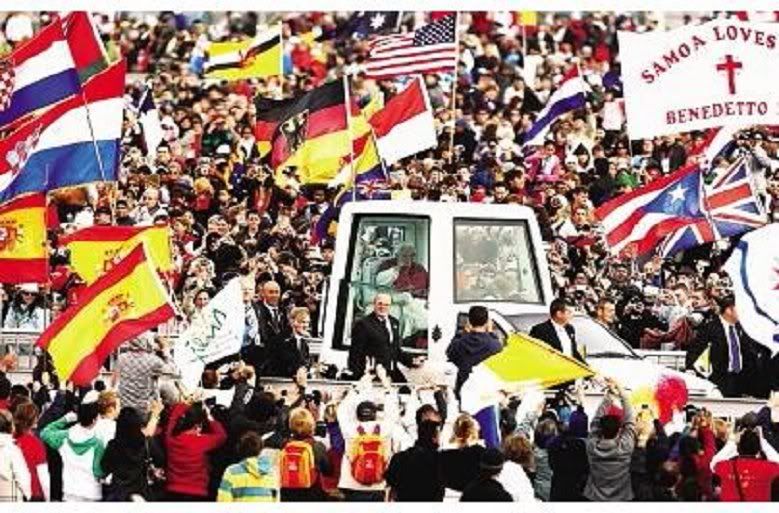
SYDNEY, Australia -'It was beautiful!" More than anything else, that's what I heard from the pilgrims who came here last week for World Youth Day (WYD), the massive Catholic pilgrimage which Toronto hosted in 2002.
I was struck by that, because the great success of Sydney 2008 could have given rise to any number of adjectives -- it was enormous, it was exciting, it was emotional, it was inspiring, it was transforming, it was exhausting. Yet repeatedly people chose to describe it as beautiful.
It was. There was the natural beauty of the Sydney Harbour, used to great effect for some of the set-piece events -- the opening Mass, the papal arrival and the dramatic presentation of the Stations of the Cross. The early sunset of the Sydney winter added an evocative celestial glow.
There was also the beauty of Sydney's architectural wonders -- the Harbour Bridge, the Opera House and St. Mary's Cathedral-- as well as the downtown parks and waterways.
One of the popular places of prayer was a new painting -- very contemporary, very Australian -- of the Madonna and Child in the cathedral.
There was the beauty, too, of the liturgy, evidence that Pope Benedict's lead is being followed in reawakening the beauty of the Catholic tradition. There were the young people, too, who in their wholesomeness and enthusiasm were beautiful to behold -- even after a long march and overnight campout.
All of which is a reminder that in the history of philosophy, particularly medieval philosophy, beauty was considered to be, alongside truth and goodness, one of the necessary attributes of reality. Something that was as it was supposed to be would be true, beautiful and good. Truth, beauty and goodness would attract us to that which was real and, eventually, to that which was most real, the source of all being, all reality, God.
Today, we usually associate the things of God with the moral life -- goodness. If we say someone is "godly" we usually mean that he is morally good and lives the virtues. Truth, too, is associated with discovering God, as we can see in the debates about what faith and reason, religion and science can tell us about what is most real.
Beauty is neglected. We consider beauty to be so subjective -- it is in the eye of the beholder -- that it can only tell us something about ourselves, and nothing about reality as it is. Beauty so conceived leads us only inward, not beyond ourselves to the transcendent.
Yet beauty retains its power. Consider natural wonders. Saint Augustine asked of them: "Who made these beautiful changing things if not one who is beautiful and changeth not?"
Man-made beauty, too, can be an encounter with the transcendent. Such is the purpose of great art and music. A WYD highlight was the Sydney Symphony performing Beethoven's Missa Solemnis at the Opera House. The music and the physical setting -- both the Opera House and the Harbour -- did not provide an argument about God, or an example of the goodness of divine providence, but rather an encounter with beauty which points beyond itself. Authentic beauty is a meeting with reality and the God who is most real.
"Life is not just a succession of events or experiences, helpful though many of them are," said Pope Benedict last week. "It is a search for the true, the good and the beautiful. It is to this end that we make our choices; it is for this that we exercise our freedom; it is in this -- in truth, in goodness and in beauty -- that we find happiness and joy. Do not be fooled by those who see you as just another consumer in a market of undifferentiated possibilities, where choice itself becomes the good, novelty usurps beauty and subjective experience displaces truth."
In contrasting novelty and beauty, Benedict was indicating that beauty has an enduring quality. World Youth Day is a new thing, and it abounds in novelties -- papal text messages, a dedicated social networking site and blogging pilgrims this time round.
In Sydney we discovered that beauty is still valid and compelling for a new generation. Where arguments may fail and goodness may be lacking, the encounter of beautiful things may draw us onward to God.
The young pilgrims cheered the symphony quite unlike the usual crowds at the Opera House. The maestro appeared quite overwhelmed. They were cheering him to be sure, but also something greater -- the One who made such beautiful music possible, and the One for whom it was performed.
 A fair dinkum Pope
A fair dinkum Pope
Editorial
 
Thu, 24 Jul 2008
Sydney certainly knows how to throw a party.
The extraordinary scenes played out on the city's streets over the course of the World Youth Day week, and relayed on television screens for huge world audiences, or reported in newspapers or on radio bulletins, have been in some respects reminiscent of the 2000 Sydney Olympics.
In other ways they have surpassed them. For this was a party quite unlike any other: five days and nights of peace, love and Christianity, enjoyed by young pilgrims from around the world; no alcohol, little trouble, barely even a hint of disorder.
To cap it all, the crowd at Sunday morning's Mass at Randwick Racecourse swelled to an estimated 350,000.
So it had been during a week of festivities for the faithful presided over by Pope Benedict XVI and labelled by some the Church's version of Woodstock.
The music was certainly there, with more than 165 concerts staged; but so were the prayer meetings, the Masses, the addresses by other Catholic luminaries, the staging of the Stations of the Cross - said to have been televised to an audience of 500 million - and the centre-stage role of the Pope himself.
In the wash-up to this remarkable gathering, perhaps aided and abetted by the sort of relaxed friendliness and ambience that so becomes our Australian cousins, it is being said that in Sydney the Pope began, finally, to reveal the hallmarks of his papacy.
To date, he has been, possibly unfairly, characterised by the most pronounced public qualities of his former self: Cardinal Joseph Ratzinger, a cool and austere intellectual German theologian - and an arch-conservative one at that.
But in the company of so many tens of thousands of smiling young pilgrims, and blessed by five days of clement Sydney winter sun, he reportedly showed a sense of humour and common humanity, allied to a genuine personal warmth. There were even flashes of charisma.
In the vernacular of the land, the Pope seemed to become, if not a superstar, a fair dinkum good bloke.
But World Youth Day 2008 was not simply a prayer party. There were serious matters for the Pontiff to attend to, not least the legacy of sexual abuse which he has inherited. Such "misdeeds, which constitute so grave a betrayal of trust, deserve unequivocal condemnation", he said.
He was "deeply sorry for the pain and suffering the victims have endured", and said that those responsible for "these evils" must be brought to justice.
For some, understandably, this apology will not have gone far enough; for others it went further than the Pope appeared to have gone before, but if the 81-year-old Pope was intent on addressing the sins of the past, he also had his sights clearly on the future - and the challenges and problems facing the young people who had gathered to hear him.
In the homily of the Randwick Mass he alluded to the cults of individualism and consumerism, calling for his audience to instead embrace the "underground river" of Christian values that would help provide firm foundations.
At a more secular level he called on world faiths and religions to unite in combating "sinister and indiscriminate violence".
And his farewell from Australia was marked by Prime Minister Kevin Rudd's announcement of a resident ambassador to the Holy See in Rome, in the form of former deputy prime minister Tim Fischer - denoting a deepening of Australia's relationship with the Vatican.
"It will," said Mr Rudd, "allow Australia to expand dialogue with the Vatican in areas including human rights, political and religious freedom, food security, arms control, refugees and people trafficking."
To this he might have added issues that continue to worry many Catholics and non-Catholics alike: contraception, especially in the Third World, the celibacy of the priesthood, the role of women in the Church, and so on. [Typically secular POV, which does not recognize that every religion has - or should have - certain non-negotiable principles, open to question by many certainly, including not a few Catholics, but for all that, not mutable at all. And Rudd, raised a Catholic, has the common sense to keep that in mind.]
Those are issues that will continue to be debated, including by many of the young people present in Sydney.
Whatever one's personal views or faith, and how they impact on these matters, there can be less debate about the significance of the World Youth Day 2008: for vast numbers of young people from greatly differing cultures and backgrounds, there are common values to be found in the Church and its teachings.
In a world that so often sees itself as hopelessly fractured, driven by difference and intolerance, rather than compassion and hope, that in itself is cause for celebration.
 Before he took it on himself to pick out the highlights of Pope Benedict XVI's discourses in Sydney (which he published in his Chiesa rubric two days ago, as posted in the SYDNEY thread of this Forum), Sandro Magister was interviewed by an online journal during which he sang the praises of the Holy Father unequivocally as he generally does.
The Pope who enchants the youth
Before he took it on himself to pick out the highlights of Pope Benedict XVI's discourses in Sydney (which he published in his Chiesa rubric two days ago, as posted in the SYDNEY thread of this Forum), Sandro Magister was interviewed by an online journal during which he sang the praises of the Holy Father unequivocally as he generally does.
The Pope who enchants the youth
by bringing them the essence
of the Christian faith:
An interview with Sandro Magister
Translated from
www. ilsussidiario.net
July 21, 2008
To say weighty things which are understandable even to simple people, to the point of calling the entire Bible the great love story between God and man culminating in Mary's Yes to the angel: this blend of intellectual profundity and communicative clarity is what veteran Vatican reporter Sandro Magister identifies as the originality of this Pope, who in Sydney proved once more that he can enchant hundreds of thousands of young people.
Benedict XVI began his participation in last week's World Youth Day speaking of a world that is threatened by an idea of human freedom that is detached from reality. He said this referring to creation, the world God created, but also to the threats to human life by human acts like abortion. It seemed like a synthesis almost of disparate elements and subjects.
It is with such a chain of arguments that Benedict XVI has effectively answered a recurrent objection. Both the secular world and a part of the Catholic world have criticized the preaching of the Catholic hierarchy, particularly the Pope, for being too insistent on the issues of defense of life and the family, and not paying enough attention, in their opinion, to emergencies like the environment and that which one might call the social ecology.
The Pope has shown that these different fields are absolutely linked - one cannot be consistent by defending one in preference to the other.
What is the foundation of this synthesis in the Pope's reasoning?
It is the plan of creation that he shows and illustrates in his preaching - with man as the summit of creation. Man is in the image of God, and is therefore the quintessence of creation as a whole.
And thus defending human life already encompassesa the inescapable commitment to defend all other aspects of creation.
The Pope made time in Sydney to meet the representatives of other Christian confessions and non-Christian religions. He spoke of a 'critical juncture' in the ecumenical dialog. What did he mean?
Many commentators have interpreted this as a reference to the situation of the Anglican Communion. But reading the Pope's address in its entirety, his reference to a 'critical juncture' was more general: he was expressing his concern for the tendency to find fault with those doctrines that each Christian confession professes as the basis for its identity.
Thus the Pope has denounced a current of thinking that is quite widespread, according to which, in order to arrive at Christian reunification, doctrinal differences must be set aside - or at least, considered secondary - as if these don't count enough. Whereas he underscores that one cannot conceive of ecumenical dialog that is not an ecumenism of truth. This insistence on truth is really the hallmark of this Pontificate, and these days have confirmed it yet again.
Madrid has been chosen to host the next WYD - a significant choice in view of the situation in Spain.
This choice was already in the air, and it was predictable that after holding WYD in a place far from Europe, it would come back some place nearer. Certainly, the choice of Madrid in particular implies a new challenge and appeal to old Europe, which may be considered Christianity's firstborn in the world, but where the Church now finds itself in remarkable difficulties. Spain in particular is emblematic of the problems that the Church is facing in Europe and in the West, in general.
Yet another time, the Pope has belied - if indeed there was still need to - the image of a professor Pope who is remote from the sensibility of the youth. What is the secret of Benedict XVI's communicative ability which always amazes?
This ability to communicate with young people is part of his ability in general to communicate with all people of whatever age and whatever cultural background. Every day simply confirms more that this is a Pope who was not made only for the academies but who is able to say weighty things to simple people in simple words.
Of course, these words are very rich and dense in significance, certainly not 'easy' in the unfavorable sense, But he is able to say important things to persons who do not need to have academic degrees to be able to listen to him and understand him. And it is true that this Pope always surprises anew in this regard. The stakes are much higher with young people, but he always carries it off.
His very choice of the Holy Spirit as the focus for this WYD already meant he would speak to them of difficult concepts. The Holy Spirit is not an easy subject...
The two major addresses were frankly of an astounding density. The address at the vigil, dedicated specially to the Holy Spirit - the 'forgotten person' of the Trinity, as he said - was truly a catechism lesson of great depth, in which he did not hesitate to cite St. Augustine, and following his example, develop a lesson on the importance and meaning of the Holy Spirit.
Then he spoke of the sacraments of Christian initiation in a way that we can call mystagogic: he made clear how tehe Sacraments are the way to come closer - and in ever greater depth - to the fact of Christianity.
And he did this very simply before a seemingly endless crowd of young people, saying these things as if he were speaking face to face with each one of them, without once descending in the least to linguistic compromises or dumbing it down to engage their attention.
In your opinion, what do you think was the highest point of Benedict XVI's communicative power at WYD?
The Angelus message, clearly written at one go by the Pope, which was an effective exposition so amazing that it even left me speechless. He put together the Old and New Testaments through the perspective of Our Lady's Yes to the angel of the Annunciation, presenting the Old Testament as the story of a long courtship, of a love story between man and God, and the New Testament as the marriage which crowns it, after Mary says Yes to his proposal.
And then he added that if this were like any other story, we could say 'and they lived happily ever after', but he points out that on the contrary, the story does not end there, it only starts with Mary's Yes, and is a story that continues to demand our commitment day after day.
A Pope who can express his ideas that way is certainly not the cut-and-dried professor that everyone - arbitrarily - expected he would be.
[Modificato da TERESA BENEDETTA 24/07/2008 15:53] |
 24/07/2008 16:47 24/07/2008 16:47 |
|
| | | OFFLINE | | Post: 14.440 | Registrato il: 28/08/2005
| Utente Gold | |
|
  www.radiovaticana.org/it1/videonews_ita.asp
For the latest videonews on the Holy Father
The Pope's public program
www.radiovaticana.org/it1/videonews_ita.asp
For the latest videonews on the Holy Father
The Pope's public program
beyond his summer holiday
Translated from the
Italian service of
 
Benedict XVI has been spending a few days of post-Sydney winding down at the papal summer residence in Castel Gandolfo preparatory to his annual two-week summer holiday in the mountains.
The Holy Father leaves for Bressanone in northeastern Italy Monday, but tomorrow, he will be meeting Iraqi Prime Minister Nuri al-Maliki, and on Sunday, he will lead the noonday Angelus as usual from the inner courtyard of the Apostolic Palace at Castel Gandolfo.
At the same time, says Fr. Federico Lombardi, director of the Vatican Press Office, preparations are going forward for two apostolic trips in September, first to Cagliari, capital of the island-region of Sardinia, on Sept. 1, and then to Paris and Lourdes on Sept. 12-15.
Fr. Lombardi was interviewed by Sergio Centofanti:
FR. LOMBARDI: The Holy Father's audience with the Prime Minister of Iraq is certainly very significant, as it has to do with the overall problem of world peace, particularly crucial in many areas of the Middle East. More directly, it has to do with the problems faced by Catholics and other Christians in that region.
In Iraq, we can think of the recent kidnapping and assassination of Mons. Rahho, and what is, in effect, the forced emigration of tens of thousands of Christians from Iraq. Iraq is therefore a nation that the Church and the Holy See regard with great involvement and concern. And we can be sure the Pope has the region in his prayers all the time.
On Monday, the Holy Father will be going to Bressanone in Alto Adige for a vacation that will last till August 11...
Yes, Bressanone is a new destination with respect to his previous summer holidays as Pope. It was his choice. He wanted to return to Bressanone, a place which is linked to so many fond memories in his life.
I would add that it is a place of particular importance for German-speaking people. The region we know as Alto Adige is called South Tyrol in German. It is a fundamental reference point in the history of German language and culture, and certainly, the Pope, as a man of great culture, and as a German, feels very much at home int hat region.
We hope it will be a period of rest for him. He has no commitments, other than the two Sunday Angelus appointments and what has become a usual feature of his vacations - a meeting with the priests of the diocese. It will certainly be a rich and interesting encounter, as it has been in the past three years.
Then he has his September commitments...
Obviously, we are already preparing for September when the Pope will immediately undertake two important events: the pastoral trip to Cagliari, and his trip to Paris and Lourdes.
Those will be followed in October by the Bishops Synod, for which the Pope has been preparing.
It is possible that in Bressanone - if all goes well and conditions are favorable - he may devote time to Volume 2 of his book on Jesus and to the social encyclical which has been awaited for some time.
Or who, knows, he may be starting something else. Like he surprised us all last year with the encyclical on hope, which had not really been anticipated, but which obviously, he brought to maturation through prayer and reflection.
So we all hope it will be another fruitful vacation for the Pope, during which he may achieve all the physical and spiritual renewal one expects from it.
[Modificato da TERESA BENEDETTA 24/07/2008 16:49] |
 24/07/2008 20:36 24/07/2008 20:36 |
|
| | | OFFLINE | | Post: 14.441 | Registrato il: 28/08/2005
| Utente Gold | |
|
  I may have missed it, but does anyone recall John Allen writing anything about a little book on Pope Benedict XVI's teachings that he has put together for Italian readers? Thanks to Lella, here is some information about it from the monthly magazine of the Societa San Paolo.
'The 10 things close to
I may have missed it, but does anyone recall John Allen writing anything about a little book on Pope Benedict XVI's teachings that he has put together for Italian readers? Thanks to Lella, here is some information about it from the monthly magazine of the Societa San Paolo.
'The 10 things close to
Pope Benedict's heart'
by BRUNO SIMONETTO
Translated from
 
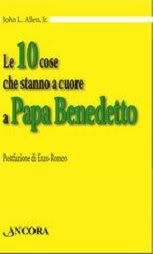 Le dieci cose che stanno a cuore
Le dieci cose che stanno a cuore
a Papa Benedetto
Discovering the 'fundamental elements of the faith'
that Pope Benedict teaches with extreme simplicity and clarity
to convey the profundity of his Magisterium
by John L. Allen Jr.
Editrice Ancora, 2008
The Rome correspondent for the American magazine National Catholic Reporter and a Vatican commentator for CNN, John L. Allen Jr. has written numerous essays on the Popes, the Vatican and the Catholic Church in general.
Recently he edited a sort of vademecum, published by the Italian publishing house Editrice Ancora, on the most significant themes of Pope Benedict XVI's Magisterium.
It is entitled Le 10 cose che stanno a cuore a Papa Benedetto - and it is safe to say they are indeed among the themes that best distinguish the teaching of Papa Ratzinger.
In the Introduction to the booklet, the author writes:
Even if Pope Benedict XVI is one of the most famous and authoritative theologians of our time, the goal of his Pontificate is not to construct a new 'grand theory' for Catholic theology.
Likewise, it is not his intention to reshape the face of the Church according to the personal sentiments of Joseph Ratzinger.
Instead, Pope Benedict's priority is to re-introduce the fundamental elements of the Gospel and of Christian tradition into the heart of today's world, seeking to show their consistency with the most profound truths of human existence.
Benedict XVI is not trying to dress up the basic teachings of Catholicism to make them attractive or appealing; rather, he wishes to lead men today to look at its teachings with new eyes, setting aside prejudices and misunderstandings which have accumulated in the course of centuries.
His presentation, necessarily brief, of 'the 10 things that are close to the heart of Benedict XVI' confirms these conclusions, allowing us to find in extreme synthesis those 'fundamentals of the faith' that Papa Ratzinger has always known how to present with extreme simplicity and clarity, to match the profundity of his Magisterium.
Thus, making use of Benedict XVI's own words, here is a summary of the '10 things' listed by John Allen:
1. God is Love
Take away everything else and you will find that the heart of the Christian message is this: God is love. The foundation of being, of he who has created and sustains all that exists, is love. In the language of the faith, we call this reality of love - God.
Because this is the central point around which the entire patrimony of the faith and Christian doctrine revolve, it was not surprising that Pope Benedict chose to call his first encyclical - usually considered 'programmatic' for a Pontificate - Deus caritas est.
We now know very well the profound contents of that encyclical, presented so many times and meditated in the subsequent Magisterium of the Church and in our daily catecheses.
2. Jesus is the Lord
In May 2007, Joseph Ratzinger published his first book as Pope: JESUS OF NAZARETH, comprising more than 400 pages, the first part of his personal essay on Jesus. It is a work that shows Pope Benedict's passion for Jesus Christ, the standpoint he has always held firmly against any 'revisionist' attempt on the figure of the Son of God who made himself man to save mankind for all time.
Since, as John Allen synthesizes it, "to remind the world that in Jesus of Nazareth, we see the definitive revelation of the significance and ultimate purpose of life, the book is the cornerstone of Benedict XVI's papacy."
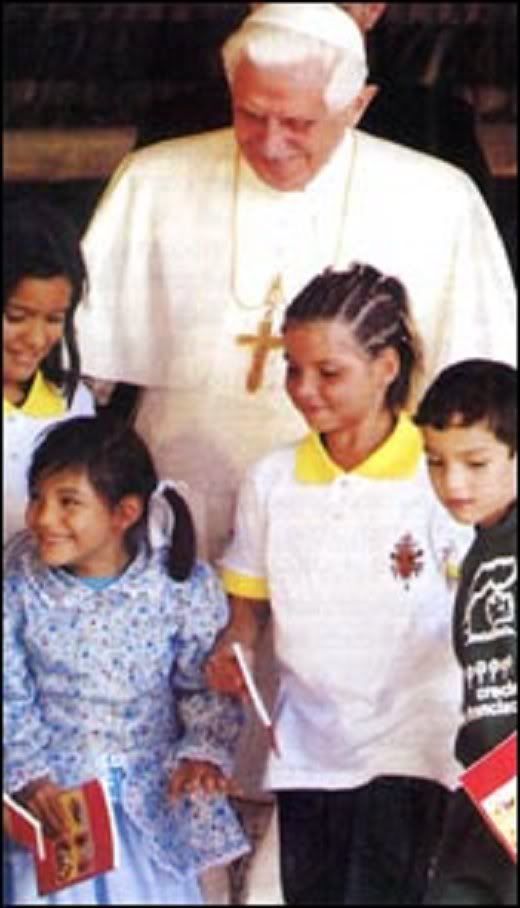 The freshness of Christian life, with its precious virtues,
The freshness of Christian life, with its precious virtues,
is evident in the rich Magisterium of Benedict XVI.
3. Truth and freedom are the two faces of the same coin
It has been said that "it one must find a word that can summarize the message of Benedict XVI to mankind in our time, that word can rightly be said to be 'truth'. Indeed, Joseph Ratzinger's episcopal motto is 'Cooperatores veritatis' - co-workers in the truth.
Here, we can limit ourselves to recalling that the day before the Conclave that elected him Pope in April 2005, then Cardinal Ratzinger memorably defined the principal challenge that the Catholic Church finds itself facing as being 'the dictatorship of relativism'.
With this term, he referred to the fact that the rejection of objective truth - truth that is independent of the epoch or the prevailing culture, that is valid everywhere, for always and for everyone - has become common opinion.
Therefore Pope Benedict insistently refers to the mortal danger that comes from doctrinal and ethical relativism, identifying it as the root of every error and perversion which have been devastating consciences in the contemporary world.
4. Faith and reason need each other
The lecture that Benedict XVI gave on September 12, 2006, at the University of Regensburg, where he had once taught theology, was entitled "Faith, reason and the university". The title makes clear what the topic of the lecture was, despite the worldwide polemics occasioned by the objection of Muslims to a citation the Pope made from a dialog between a 14th-century Byzantine emperor and a Persian scholar, in which the emperor criticized Mohammed and Islam.
Benedict XVI summarized the testimony of the Bible and Christianity about ultimate origins this way: God is Logos, creative reason himself. Therefore, "not to act according to reason is contrary to the nature of God".
Christianity presupposes the rationality of God, and on the basis of this conviction, Christianity itself should follow reason. To abandon the use of human reason, to transform the Christian faith into a form of religious fundamentalism, would be inconsistent with the intrinsic rationality of God himself.
More in general, Pope Benedict tells us, faith and reason desperately need each other - above all, because they are in harmony insofar as reason presupposes faith, in the sense that the mental attitude that marks man's scientific research into nature has its roots in the Judaeo-Christian tradition, whether scientists today recognize it or not.
In turn, this teaching by Pope Benedict cannot be faulted as religious fundamentalism, because the history of science itself proves it.
5. The Eucharist is the heart of Christian life
When Benedict XVI went to Cologne for World Youth Day in August 2005, many Germans expected the Pope to call for commitment on various fronts, from the steady reduction in the number of Massgoers, to internal dissents within the Church to the widespread refusal to allow a public role for religion.
Instead, Benedict's message was the 'softest' that could be imagined, even as it was also the most radical.
In his homily for the concluding Mass, he chose to meditate on the Eucharist - the gift of himself that Christ made in the form of bread and wine - using a memorable metaphor ("a nuclear fission in the intimate depths of our being") to describe the consequences of this gift, speaking to the million youth who had gathered for WYD.
Subsequently, in March 2007, Benedict published his Apostolic exhortation Sacramentum caritatis, summarizing and annotating the conclusions reached by the Bishops' Synod on the Eucharist held at the Vatican in October 2005.
This document contains the most detailed Ratzingerian reflection on the Eucharist, a mystery to believe, to celebrate, to live, to announce and to offer the world: truly a 'summa theologica' on the mystery of the Eucharist.
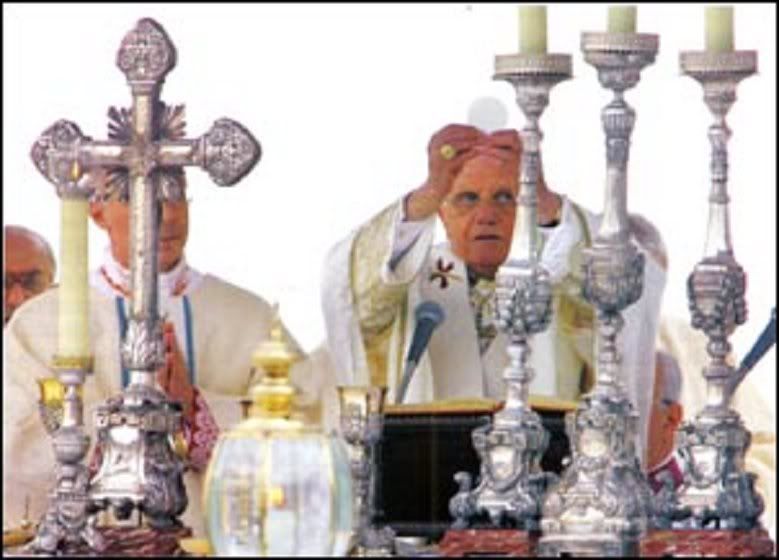 Celebration of the Eucharist is the heart of Benedict XVI's life and Magisterium.
Celebration of the Eucharist is the heart of Benedict XVI's life and Magisterium.
6. Christianity is a positive message
One of the salient aspects of Benedict XVI's Pontificate is his desire to present his message in positive terms. For example, when the Holy Father visited Spain in July 2006, many expected a dramatic confrontation with Prime Minister Jose Luis Zapatero whose government has opposed (and continues to oppose) Church teachings on many fronts: divorce, abortion, gay marriage, euthanasia and denying government financial aid to Catholic schools.
In fact, many Catholics had expected hell and brimstone from this Pope. Instead, he has been obstinately positive, focusing on the fundamentals of Christian faith, without involving himself directly - except in terms of articulating general principles - in any of the questions that have placed the Church in confrontation with the State.
On the eve of his trip to Bavaria, he was asked on German TV about this, and he replied: "Christianity, Catholicism in particular, is not a collection of prohibitions; it is a positive choice. It is very important that we remember this, because today, this is something that has been almost totally ignored."
In other words, the Pope wants Christians to let the 'good news' of the faith shine through the way they live, so that its inner beauty may once again be visible in a world that has become accustomed to seeing Christianity as little more than a demanding system of rules and regulations - all prohibitions and little 'positive' to offer .
7. The Church helps form consciences, but keeps out of politics.
Pope Benedict has written in Deus caritas est that "justice is the objective and therefore, also the intrinsic measure of every policy".
According to Benedict XVI's moral vision, a Christian should work for a just social order, which means, among other things, a special attention towards the poor and the needy.
Addressing the Latin American bishops on May 13, 2007, the Pope expressed himself positively on what the advocates of 'liberation theology' called 'the preferential option for the poor', pointing out that such an option is implicit in the Christian's faith in a God who made himself "poor and humble for us" - with all the consequences that such a statement has.
In fact, Pope Benedict has spoken repeatedly in behalf of the poor, often using language that has very concrete political implications. At the same time, he has made it clear that the role of the Church is to affirm moral values, not to furnish specific political directives to be translated into definitive legislation, adding: "Only by remaining independent can [the Church] teach its great principles, its inalienable values, in order to guide consciences and offer a choice of life that goes beyond the political sphere."
8. The importance of the Catholic identity
In his innumerable writings and the interventions of his Magisterium, Pope Benedict underscores how many Catholics today find it easier to subscribe to the secularized values of modernity rather than Church tradition.
To set the priority once again on the 'Catholic difference' - a theological version of what sociologists call 'the politics of identity' - has been and continues to be, in many ways, the life work of Joseph Ratzinger.
These are ideas that he expressed specifically in the 1984 interview book Rapporto sulla Fede [published in English as The Ratzinger Report], in which then Cardinal Ratzinger told journalist Vittorio Messori: "Among the most urgent tasks that Christians should face is that of recovering the ability to be non-conformist: that is, the ability to oppose many of the cultural tendencies around them".
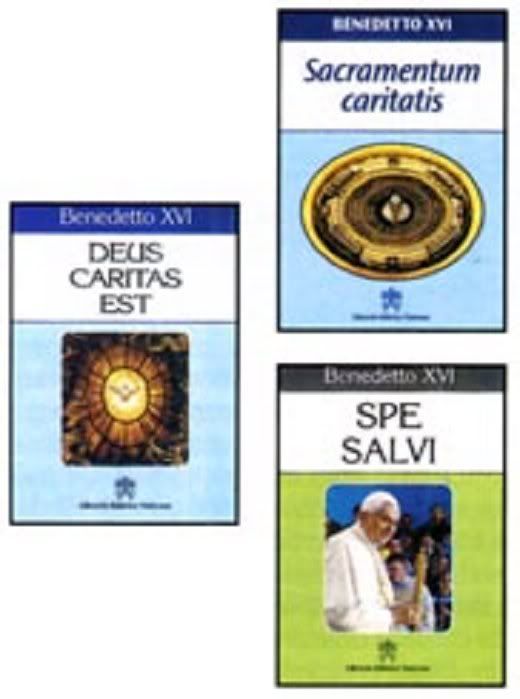
9. Christ and the Church are inseparable
Benedict XVI is well aware that many men and women today find Jesus of Nazareth a fascinating figure, but at the same time, they are in conflict with many aspects of traditional Christian religion. The natural temptation has been to 'choose' Jesus but do without the 'mediation' of the Church.
But, Pope Benedict points out, one cannot truly love Jesus Christ and follow his teachings without being part of the family of faith that he himself created: "There is no opposition whatsoever," he says, "between Christ and the Church. They are inseparable, notwithstanding the miseries of the men who make up the Church".
And therefore, in reply to the slogan "Christ yes - the Church no", Benedict XVI points out, "To say Yes to Christ is to say Yes to the Church".
10. The virtue of patience
Pope Benedict XVI teaches the world by his own example of a holy life, above and beyond his extraordinary Magisterium as a great Doctor of the Church for modern times.
In an impatient world, such as even the eccleiastical world often is, Benedict XVI is a very patient man. The 'decalogue' of Pope Benedict's Magisterium states not just that which is closest to his heart - but what should be closest to the heart of every believer.
[Modificato da TERESA BENEDETTA 24/07/2008 21:16] |
 25/07/2008 14:10 25/07/2008 14:10 |
|
| | | OFFLINE | | Post: 14.444 | Registrato il: 28/08/2005
| Utente Gold | |
|
     Don't forget you can always see the latest videoclips on the Holy Father here:
www.radiovaticana.org/it1/videonews_ita.asp
Videoclip of the meeting with Prime Minister Al-Maliki is now online
BENEDICT XVI MEETS
Don't forget you can always see the latest videoclips on the Holy Father here:
www.radiovaticana.org/it1/videonews_ita.asp
Videoclip of the meeting with Prime Minister Al-Maliki is now online
BENEDICT XVI MEETS
IRAQI PRIME MINISTER
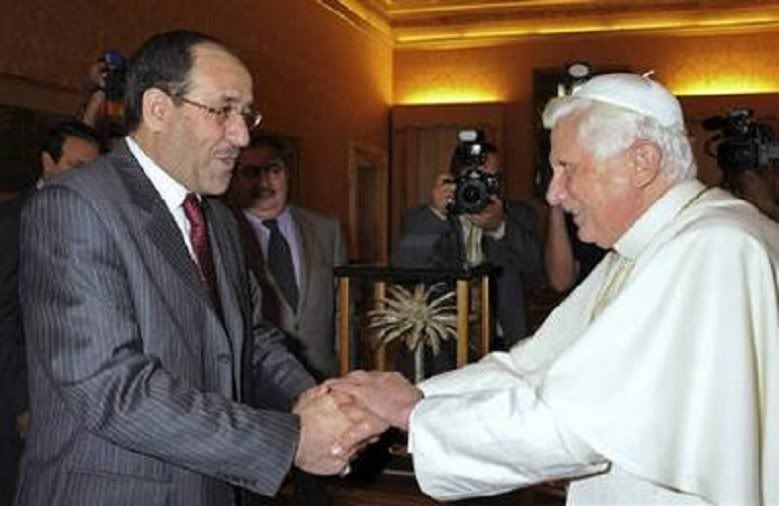
COMMUNIQUE FROM THE VATICAN PRESS OFFICE
Translated from

July 25, 2008
Today, at the Apostolic Palace in Castel Gandolfo, the Holy Father Benedict XVI met with His Excellency Nuri Kamel al-Maliki, Prime Minister of the Republic of Iraq.
Earlier, the Prime Minister met with the Secretary of state, Cardinal Tarcisio Bertone, who was accompanied by the Secretary for Relations with Froeign States, Mons. Dominique Mamberti.
The conversations which took place in an atmosphere of cordiality, allowed the participants to examine some fundamental aspects of the Iraqi situation, including its regional context.
Particular attention was given to the issue of the great number of Iraqi refugees, within the country and outside it, who need assistance, particularly for an eventual return to their homes.
The participants renewed their condemnation of the violence that continues to strike different parts of the country almost daily, among them the Christian communities who strongly need much better security.
It is the common wish that Iraq may find the way to peace and development through dialog and the collaboration of all ethnic and religious groups, including the minorities, with respect for their respective identities, so that in a spirit of reconciliation and the search for the common good, they may help in the moral and civic reconstruction of the country. The importance of inter-religious dialog as a way to religious understanding and civil coexistence was emphasized.
The Prime Minister extended an invitation to the Holy Father to visit Iraq.
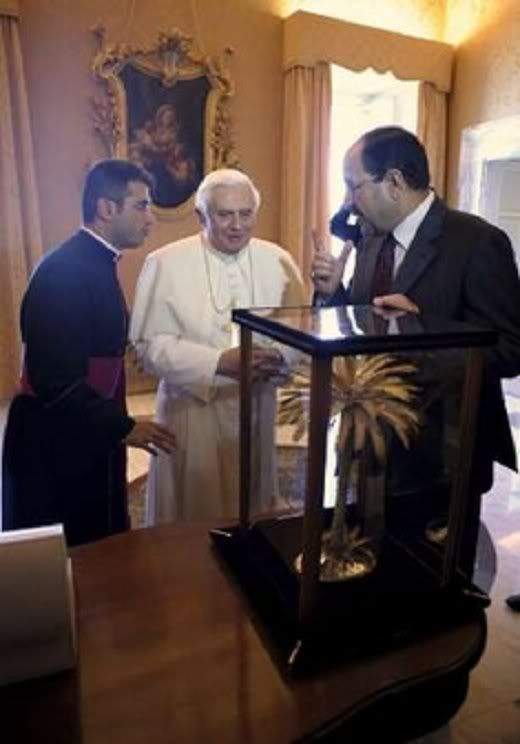 Maliki invites Pope
Maliki invites Pope
to visit Iraq to help peace
By Philip Pullella

CASTEL GANDOLFO, Italy, July 25 (Reuters) - Iraqi Prime Minister Nuri al-Maliki invited Pope Benedict on Friday to visit Iraq, saying it would help the process of reconciliation.
Maliki, who met the pope for 20 minutes at the pontiff's summer residence, also denied in comments to reporters afterward that minority Christians were being persecuted by Muslims in Iraq.
"We renewed our invitation for his holiness to visit Iraq. He welcomed the invitation. And we hope that he will be making the visit as soon as he can," he said.
"His visit would represent support for the efforts of love and peace in Iraq," he added.
The late Pope John Paul wanted to visit Iraq in 2000 but was denied permission by the government of Saddam Hussein.
Maliki said he and the pope also discussed the plight of minority Christians in Iraq and the prime minister urged those who had left after the U.S.-led invasion in 2003 to return to help rebuild the country.
"I also appealed to His Holiness to encourage Christians who left the country to go back and be part of the social structure of Iraq again," he said.
Many of Iraq's Christians have left the country, among the two million refugees who have fled to neighboring states.
Iraq's small Christian minority has tried to keep out of the Shi'ite-Sunni sectarian violence that has killed tens of thousands of Iraqis since the 2003 U.S.-led invasion. But Christian clergy and churches have been targeted repeatedly by Sunni militant groups linked to Al Qaeda.
The Archbishop of Mosul of Iraq's largest Christian denomination, the Chaldean Catholics, was kidnapped in the northern city in February and found dead two weeks later.
Maliki said the Pope understood the inter-religious situation in Iraq.
"He expressed this by saying that bad people exist within all religions, whether Christians or Muslims," Maliki said.
"This sound, realistic, objective understanding by His Holiness is the best answer to those who claim that Christians are persecuted in Iraq by Muslims," he said.
A Vatican statement said Christian communities in Iraq "strongly feel the need for greater security" and that inter-religious dialogue would be important for the country's future.
Iraqi PM discusses
Christian refugees with pope

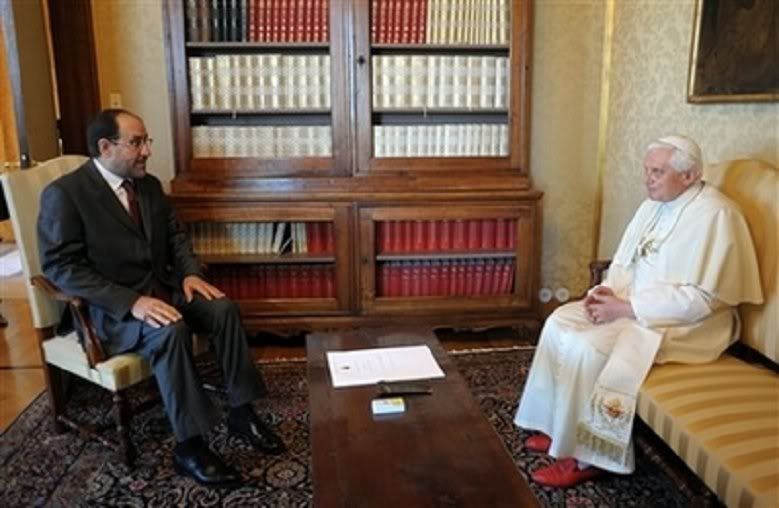
CASTEL GANDOLFO, Italy, July 25 (AFP) - Iraqi Prime Minister Nuri al-Maliki on Friday discussed with Pope Benedict XVI the plight of the war-torn country's Christians, according to a Vatican statement.
Maliki, who had a 20-minute meeting with the Pontiff at his Castel Gandolfo summer residence, also met other officials including Vatican secretary of state Tarcisio Bertone.
They discussed the situation of "many refugees inside and outside the country who need help, in particular with regards to their return," said the statement.
The two men also issued a renewed condemnation of the continuing violence in Iraq, where Christian communities "strongly feel the need for greater security," it added.
The Vatican hoped "that Iraq can find a path to peace and development through dialogue and cooperation with all ethnic and religious groups including minorities in respect of their respective identities," it said.
Maliki, who met his Italian counterpart Silvio Berlusconi on Thursday, also invited the pope to visit Iraq.
In March, the body of Iraq's kidnapped Chaldean Catholic archbishop, Paulos Faraj Rahho, was found near the northern city of Mosul, prompting warnings of a mass exodus of Christians from Iraq.
Iraq's Christians, with the Chaldean rite by far the largest community, were said to number as many as 800,000 before the US-led invasion. The number today is believed to have dropped to half that figure due to massive emigration.
Associated with the "Crusader" invaders and regarded as well-off, they are often victims of sectarian violence, killings and kidnappings at the hands of both Sunni and Shiite Islamists, as well as criminal gangs.
On January 6, a series of bombs exploded outside churches and a monastery in Mosul, in an apparently coordinated attack that wounded four people and damaged buildings, as Christians celebrated Epiphany.
Maliki was due to leave Italy and return to Iraq on Saturday.
[Modificato da TERESA BENEDETTA 25/07/2008 17:24] |
 25/07/2008 14:39 25/07/2008 14:39 |
|
| | | OFFLINE | | Post: 14.445 | Registrato il: 28/08/2005
| Utente Gold | |
|


Forty years ago today, Pope Paul VI issued the encyclical Humanae Vitae. The English text may be found on
www.vatican.va/holy_father/paul_vi/encyclicals/documents/hf_p-vi_enc_25071968_humanae-vitae...
It is a very moving and compelling document.
* * * * * * * * * * * * * * * * * * * * * * * * * * * * * * * * * * * * * * * * * * * * * * * * * * * * * * * *
40 years of 'Humanae vitae':
A sign of contradiction
Editorial
by Giovanni Maria Vian
Translated from
the 7/25/08 issue of

Forty years ago today, on July 25, 1968, Paul VI signed Humanae vitae, the encyclical which rejected artificial contraception, and expressed itself strongly against sexual hedonism and the politics of family planning generally imposed on poorer nations by the more powerful.
As soon as it was published on July 29, the encyclical raised unprecedented opposition within the Catholc Church itself, to the point that the Pope decided not to use again the solemn form of the encyclical - most probably in order not to expose the Pontifical authority to pointless abuse.
"Rarely has a text in the recent history of the Magisterium," wrote Cardinal Joseph Ratzinger in 1995, "become such a sign of contradiction as this encyclical which Paul VI wrote after making a decision that he profoundly suffered through."
To explain the controversial reaction and dissent provoked by the encyclical, many factors concurred, from the overall cultural climate of those years (it was the fateful summer of 1968) to the enormous economic interests affected by the encyclical.
But Papa Montini never changed his stand on this crucial issue. A few weeks before his death, speaking to the College of Cardinals on June 23, 1978, he reiterated that "after reviewing the most serious conclusions from science," the decision he made in 1968 - consistent with Vatican-II which affirmed the principle of respect for natural law - was squarely for "a conscientious and ethically responsible parenthood".
In his subsequent homily for the Feast of Saints Peter and Paul, which was explicitly presented as a balance sheet of his Pontificate, Papa Montini cited Populorum progressio and Humanae vitae as expressions of that defense of human life that he defined as an integral element of service to the truth of the faith.
Described mockingly by its critics as 'the encyclical against the pill', this papal document - in clear continuity with the Magisterium of Pius XI and above all of Pius XII, which were subsequently cited in this respect in Vatican-II's pastoral constitution Gaudium et spes - as well as consistent with the important conciliar statements on the concept of matrimony - was nonetheless submerged in controversy.
Today, in the face of the disquieting developments in genetic engineering, Humanae vitae appears lucid and prophetic in its statement that "if one does not wish to expose to man's arbitration the mission of generating life, then unbreachable limits must be recognized to the possibility of man's dominion over his own body and its functions - limits which are not licit for any man, as a private individual or as someone in authority, to breach."
The storm that raged against Paul VI's encyclical obscured its teaching on matrimony, which it described not as "an effect of chance nor the evolutionary product of unconscious natural forces" but instituted by God.
A sacrament for those who have been baptized, matrimony is, "above all", Humanae vitae affirms, "a love that is fully human, that is to say, sensitve and spiritual", as well as "a very special form of personal friendship in which the spouses share everything."
The preparation of the text was preceded by the work of a Pontifical Commission for the Study of Populations, Family and Natality, which, as is known, concluded with a consensus - far from unopposed, which is not as well-known - in favor of contraception as licit within the context of 'responsible parenthood'.
Paul VI, as he states in the encyclical, did not feel himself bound by this conclusion, and was criticized and assailed for that decision.
But one must not forget the other consensi that emerged. On September 6, 1968, Jean Guitton defined the encyclical as 'ferme mais non fermee'(firm but not closed), in that "while it speaks of the narrow path", it also shows that "it is the open way towards the future", and the Jesuit Cardinal theologian Jean Danielou underscored that the encycloical "makes us feel the sacred character of human love" and expresses "a protest against technocracy".
As an authentic sign of contradiction, not many recall Humanae vitae gladly. Certainly not for its demanding and countercurrent teaching. But even because it is not useful to play the recurrent game of pitting one Pope against another - perhaps useful for historians to underscore obvious differences - but which must be rejected when used exploitatively which is the case most often in the media.
Indeed, among Pope Paul VI's strongest supporters in this matter were Cardinal Karol Wojtyla - the Archbishop of Cracow who had an important role in the enlarged commission of inquiry, and who later innovated much about the issue in his Pontifical Magisterium on the body and sexuality; and theologian Joseph Ratzinger, whom Paul VI would make a cardinal nine years later.
Which goes to show the vital continuity of the Christian proposition evene= on the question of birth control, which as early as June 23, 1964, Paul VI had defined as 'an extremely serious issue' because "it touches the sentiments and interests nearest to the experience of being man and woman".
* * * * * * * * * * * * * * * * * * * * * * * * * * * * * * * * * * * * * * * * * * * * * * * * * * * * * * * *
Catholic critics ask Pope
to lift contraception ban
By Philip Pullella
 Clearly a publicity stunt. They know, as Catholics, the Pope will never 'lift the ban on contraception' nor indicate in any way that artificial contraception is acceptable to the Church. The natural way of birth control only involves abstaining during the woman's fertile days - that's three days at most out of 28 days every month when conception is possible, which covers the time period when the woman is likely to ovulate. Is 3 days abstention once a month too much to ask of Catholics who should regard their religion the way one should?
Clearly a publicity stunt. They know, as Catholics, the Pope will never 'lift the ban on contraception' nor indicate in any way that artificial contraception is acceptable to the Church. The natural way of birth control only involves abstaining during the woman's fertile days - that's three days at most out of 28 days every month when conception is possible, which covers the time period when the woman is likely to ovulate. Is 3 days abstention once a month too much to ask of Catholics who should regard their religion the way one should?
ROME, July 25 (Reuters) - More than 50 dissident Catholic groups published an unusually frank open letter to Pope Benedict on Friday saying the Church's ban on contraception has been "catastrophic" and urging him to lift it.
[They think contraception is 'catastrophic'. But these are the very same people who also advocate and practice abortion on demand - and they don't see that as catastrophic at all!]
The letter was published as a paid half-page advertisement in Corriere della Sera, Italy's largest newspaper, on the 40th anniversary of the late Pope Paul VI's controversial encyclical Humanae Vitae, which enshrined the ban.
While criticism of the Vatican and its views is fairly common in articles and editorials in Italian newspapers, it is unusual for a group to take out paid advertising against the Pope, particularly in a large-circulation mainstream newspaper. [Big deal! As if it was not bound to come sooner or later! And as if what they have been saying against the Pope - in print, in demonstrations, on radio and TV - were any less vitriolic or dissident! So they paid for it - big deal again! Split up among 50 groups, the cost to each individual could hardly be a burden to these usually affluent dissidents!]
The letter, written in Italian, said the Church's anti-contraception policy "has had a catastrophic impact on the poor and powerless around the world, endangering women's lives and leaving millions at risk of HIV." [They obstinately ignore the documented results of abstinence in countries like Uganda where the Church's abstinence campaign has demonstrably brought down the rate of HIV infection, in contrast to other places in Africa which rely exclusively on condoms! The AIDS virus is transmitted by body fluids - any normal-thinking unbiased person will see that a condom will not and cannot prevent other body fluids from being transmitted to other persons!]
It also said that 40 years on, the encyclical continued to be "a source of great conflict and division in the Church" and because most Catholics use contraception and feel they are not sinning, the policy has been "an utter failure."
Pope Paul's encyclical, written in 1968, has been defended by his successors John Paul and Benedict.
The Church teaches that nothing should block the possible transmission of life and approves only natural methods of birth control such as the rhythm method, in which a couple abstain from intercourse during a woman's fertile time.
Paul's encyclical, written at the height of the 1960s sexual revolution, is perhaps the most controversial and divisive in modern Church history.
As recently as last May, Benedict defended the encyclical as far-sighted and said it was "all too often misunderstood and misinterpreted."
At the time, Benedict said love between a married couple could not "remain closed to the gift of life."
The letter was signed by groups such as Catholics for Choice, which is U.S. based, We Are Church, which has branches in numerous countries, and New Ways Ministry, which helps minister to gay Catholics.
"We thought the establishment in Rome and the Vatican pay close attention to the Italian media and the letter would be seen by the people to whom we want to deliver this message," Jon O'Brien, president of Catholics for Choice, told Reuters by telephone from Washington.
The Vatican said it would likely issue a statement on the letter later on Friday.
"It is clear to us that the Catholic church cannot move forward until it honestly confronts the paradox of Humanae Vitae," the letter said.
"Most Catholics use modern contraceptives, believe it is a moral choice to do so and consider themselves Catholics in good standing, yet the Catholic hierarchy completely denies this reality, forcing the clergy into silence on this and most other issues related to sexuality," it said.
The letter concluded:
"Pope Benedict, we call on you to use to use this anniversary as an opportunity to start the process of healing by being true to the positive aspects of Catholic teachings on sexuality and lifting the ban on contraception to allow Catholics to plan their families safely and in good conscience."
Call on! What about asking yourselves and others to make the small and reasonable sacrifice of abstention during the woman's fertile days instead?
 Fr. Federico Lombardi, director of the Vaitcan Press Office, issued this statement today to the 'open letter to Benedict XVI' published as a full-page ad in Corriere della Sera
Fr. Federico Lombardi, director of the Vaitcan Press Office, issued this statement today to the 'open letter to Benedict XVI' published as a full-page ad in Corriere della Sera.
The Vatican comments
on 'open letter' ad
Translated from the
Italian service of
 
The anniversary of the publication of Humane Vitae has earned the attention of some media outlets. In particular, Corriere della Sera today hosts a full-page paid advertisement, 'An O[pen Letter to the Pope" with a list of signatory associations calling themselves collectively 'Catholcis for choice.'
Our director, Fr. Federico Lombardi, has made some observations in this regard:
First of all: The signatoreis are a number of groups well known for their opposition, not limited to Catholic teaching on conjugal morality but many other issues (such as ordination of women as priests) and have therefore presented themselves in the past against the Magisterium of the Church.
Therefore, there is nothing new.
Besides, one must not be impressed by the number of groups mentioned because most of them are different regional sections of the same group, and many others are not significant.
Moreover, the most severe accusation (in the letter) - that is, that the Catholic stand against the use of condoms is the ereason for the spread of AIDS, and theerfore, of pain and death, by beign an obstacle to 'enlightened policies' on public health - is manifestly unfounded.
The spread of AIDS is completely independent of the religious affiliation of those affected and of the influence of the Church hierarchy; and the policy of responding to the AIDS epidemic mainly by distributing condoms has largely failed.
The asnwer to AIDS requires much more profound and detailed responses, in which the Church has been active on many fronts.
Above all, the letter does not even remotely touch on the true question which is at the center of Humanae vitae, that is, the link between the human and spiritual relationship of spouses, and the exercise of their sexuality as its expression and its fruitfulness.
In the entire letter, the word 'love' is never mentioned. It would seem that this is of no interest at all to the signatories.
It would seem that for them, the only hope for couples and for the world lies in artificial contraception.
But to understand the meaning of the encyclical and its 'prophetic' value, it would be well for them to re-read Pope Benedict XVI's speeh on May 10 to the participants of the international congress held at the Pontifical Lateran University to mark the 40th anniversary of Humanae Vitae.
It is evident that this (advertisement) is not an article that expresses a theological or moral position, but is simply a propaganda piece to advocate the use of contraceptives. We must ask who paid for it and why.

ADDRESS OF HIS HOLINESS BENEDICT XVI
TO PARTICIPANTS IN THE INTERNATIONAL CONGRESS
ORGANIZED BY THE PONTIFICAL LATERAN UNIVERSITY
ON THE 40th ANNIVERSARY OF THE ENCYCLICAL 'HUMANAE VITAE'
Clementine Hall
Saturday, 10 May 2008
Venerable Brothers in the Episcopate and in the Priesthood,
Dear Brothers and Sisters,
I welcome you with great pleasure at the conclusion of your Congress which has involved you in reflecting on an old and ever new problem: responsibility and respect for human life from its conception.
I greet in particular Archbishop Rino Fisichella, Rector Magnificent of the Pontifical Lateran University, which organized this International Congress, and I thank him for his words of welcome.
I then extend my greeting to the distinguished Speakers, the Lecturers and all the participants who have enriched these busy days of work with their contributions.
Your papers fittingly contribute to the broader output on this topic - so controversial, yet so crucial for humanity's future - which has increased in the course of the decades.
In the Pastoral Constitution on the Church in the Modern World, Gaudium et Spes, the Second Vatican Council was already addressing scientists, urging them to join forces to achieve unity in knowledge and a consolidated certainty on the conditions that can favour "the proper regulation of births" (n. 52).
My Predecessor of venerable memory, the Servant of God Paul VI, published his Encyclical Letter Humanae Vitae on 25 July 1968. The Document very soon became a sign of contradiction.
Drafted to treat a difficult situation, it constitutes a significant show of courage in reasserting the continuity of the Church's doctrine and tradition. This text, all too often misunderstood and misinterpreted, also sparked much discussion because it was published at the beginning of profound contestations that marked the lives of entire generations.
Forty years after its publication this teaching not only expresses its unchanged truth but also reveals the farsightedness with which the problem is treated.
In fact, conjugal love is described within a global process that does not stop at the division between soul and body and is not subjected to mere sentiment, often transient and precarious, but rather takes charge of the person's unity and the total sharing of the spouses who, in their reciprocal acceptance, offer themselves in a promise of faithful and exclusive love that flows from a genuine choice of freedom.
How can such love remain closed to the gift of life? Life is always a precious gift; every time we witness its beginnings we see the power of the creative action of God who trusts man and thus calls him to build the future with the strength of hope.
The Magisterium of the Church cannot be exonerated from reflecting in an ever new and deeper way on the fundamental principles that concern marriage and procreation.
What was true yesterday is true also today. The truth expressed in Humanae Vitae does not change; on the contrary, precisely in the light of the new scientific discoveries, its teaching becomes more timely and elicits reflection on the intrinsic value it possesses.
The key word to enter coherently into its content remains "love". As I wrote in my first Encyclical Deus Caritas Est: "Man is truly himself when his body and soul are intimately united.... Yet it is neither the spirit alone nor the body alone that loves: it is man, the person, a unified creature composed of body and soul, who loves" (n. 5).
If this unity is removed, the value of the person is lost and there is a serious risk of considering the body a commodity that can be bought or sold (cf. ibid).
In a culture subjected to the prevalence of "having' over "being', human life risks losing its value. If the practice of sexuality becomes a drug that seeks to enslave one's partner to one's own desires and interests, without respecting the cycle of the beloved, then what must be defended is no longer solely the true concept of love but in the first place the dignity of the person.
As believers, we could never let the domination of technology invalidate the quality of love and the sacredness of life.
It was not by chance that Jesus, in speaking of human love, alluded to what God created at the beginning of the Creation (cf. Mt 19: 4-6). His teaching refers to a free act with which the Creator not only meant to express the riches of his love which is open, giving itself to all, but he also wanted to impress upon it a paradigm in accordance with which humanity's action must be declined.
In the fruitfulness of conjugal love, the man and the woman share in the Father's creative act and make it clear that at the origin of their spousal life they pronounce a genuine "yes" which is truly lived in reciprocity, remaining ever open to life.
This word of the Lord with its profound truth endures unchanged and cannot be abolished by the different theories that have succeeded one another in the course of the years, and at times even been contradictory.
Natural law, which is at the root of the recognition of true equality between persons and peoples, deserves to be recognized as the source that inspires the relationship between the spouses in their responsibility for begetting new children.
The transmission of life is inscribed in nature and its laws stand as an unwritten norm to which all must refer. Any attempt to turn one's gaze away from this principle is in itself barren and does not produce a future.
We urgently need to rediscover a new covenant that has always been fruitful when it has been respected; it puts reason and love first. A perceptive teacher like William of Saint-Thierry could write words that we feel are profoundly valid even for our time: "If reason instructs love and love illumines reason, if reason is converted into love and love consents to be held within the bounds of reason, they can do something great" (De Natura et dignitate amoris, 21, 8).
What is this "something great" that we can witness?
It is the promotion of responsibility for life which brings to fruition the gift that each one makes of him or herself to the other.
It is the fruit of a love that can think and choose in complete freedom, without letting itself be conditioned unduly by the possible sacrifice requested.
From this comes the miracle of life that parents experience in themselves, as they sense the extraordinary nature of what takes place in them and through them.
No mechanical technique can substitute the act of love that husband and wife exchange as the sign of a greater mystery which (as protagonists and sharers in creation) sees them playing the lead and sharing in creation.
Unfortunately, more and more often we see sorrowful events that involve adolescents, whose reactions show their incorrect knowledge of the mystery of life and of the risky implications of their actions.
The urgent need for education to which I often refer, primarily concerns the theme of life. I sincerely hope that young people in particular will be given very special attention so that they may learn the true meaning of love and prepare for it with an appropriate education in sexuality, without letting themselves be distracted by ephemeral messages that prevent them from reaching the essence of the truth at stake.
To circulate false illusions in the context of love or to deceive people concerning the genuine responsibilities that they are called to assume with the exercise of their own sexuality does not do honour to a society based on the principles of freedom and democracy.
Freedom must be conjugated with truth and responsibility with the force of dedication to the other, even with sacrifice; without these components the human community does not grow and the risk of enclosing itself in an asphyxiating cycle of selfishness is always present.
The teaching expressed by the Encyclical Humanae Vitae is not easy. Yet it conforms with the fundamental structure through which life has always been transmitted since the world's creation, with respect for nature and in conformity with its needs.
Concern for human life and safeguarding the person's dignity require us not to leave anything untried so that all may be involved in the genuine truth of responsible conjugal love in full adherence to the law engraved on the heart of every person.
With these sentiments I impart the Apostolic Blessing to you all.
 'A prophetic and courageous document
'A prophetic and courageous document
in defense of life and responsible love'
Interview with Mons. Rino Fisichella
President
   Translated from the
Translated from the
Italian service of
 
Alessandro Gisotti interviewed Mons. Rino Fisichella, recently named president of the Pontifical Academy of Life and rector of the Pontifical Lateran University:
MONS. FISICHELLA: Paul VI fulfilled a desire expressed by Vatican-II. Above all, we must see a continuation in the teaching of Humanae vitae with that of the Council Fathers. They had wanted a teaching on what should be an honest regulation of procreation.
In my opinion, the teaching of Humanae Vitae takes up two fundamental principles in depth: The first is that of natural law, which is the true acknowledgment of equality among human beings according to the natural order, without reference to technology. Transmission of life can be given in full freedom and is a gesture of authentic love.
The second principle is the appeal for responsible parenthood. Let us not forget that Humanae Vitae speaks of responsible parenthood, and therefore of a choice that is not left to chance, but a choice freely made, a choice to be responsible in preparing oneself to be a parent. From this point of view, I believe that even if it has been bitterly opposed, its teaching has been very farsighted.
And we should not forget the year of its publication: 1968. It really took great courage on the part of Papa Montini who suffered widespread derision and opposition to it, but never stepped back...
Before the encyclical, Paul VI had asked a commission to study the question in depth. The Commission came back with two reports - a majority report and a minority one.
Paul VI reflected a lot on his decision, and in the solitude that characterizes the life of every Pontiff, especially at such dramatic moments when one must make a painful choice, he chose - and I don't think he could have chosen otherwise - to promulgate a teaching which was in full continuity with what the Church has always and everywhere believed and affirmed.
And yes, one must not forget that it came out in 1968 - so that Humanae Vitae was immediately seen as a sign of contradiction. But the Pope reaffirmed - with great courage, with unparalleled courage, I might even say - the continuity of tradition, the continuity of doctrine, and most of all, he demondtrated a fundamental principle: truth is not determined by majority vote. Truth comes from faithfulness to the Gospel and to the teaching of the Church.
Man is fully himself when he is received into the world in a profound unity - the body cannot be detached from the soul, the experience of love cannot be dissociated from the sexual experience. When there is a dichotomy instead of profound unity, then even the value of the individual is debased, the body becomes an object, and the partner in the relationship becomes nothing more than a tool for one's self-gratification. And none of that is right.
Humanae vitae also shows the danger of technological invasion into the most intimate sphere of human life. Was Paul VI prophetic in this respect?
Not only was he prophetic. Today, his teaching has been taken up unequivocally by many scientists and philosophers who have been able to evaluate it in the light of scientific and technological developments.
Thus, we can say that the anthropological bases and the ethical foundations that underlie Humanae Vitae live on in their profound truth, namely, the dignity of the human being and the freedom to act responsibly.
Science should make progress, but in matters that affect human life, it should always consider that life is a gift from God, and that each of us owes this gift to him.

Please turn to READINGS
freeforumzone.leonardo.it/discussione.aspx?idd=355008&p=6&#idm...
for an excellent article from FIRST THINGS that documents the aftermath of Humanae Vitae.
NB: I adapted the graphics used here from the site of
www.cornerstoneconference.org/
on a conference to be presented August 8-9 in Oakland by the St. Anthony of Padua Institute and the Diocese of Oakland on Paul VI's historic encyclical.
The papal encyclical Humanae vitae was published on July 25, 1968, provoking a dramatic response.
Today, many Catholics know only of the encyclical’s proscription against contraception. Very few properly understand the beauty or the full range of Paul VI’s prophetic teaching, as an essential element
of the consistent defense of life and the joyful celebration of married sexuality, later elaborated in John Paul II’s Theology of the Body.
This conference will present an explanation of the encyclical, with attention to the primacy of conscience, the Theology of the Body, ‘reproductive’ technologies and women’s health, and the intimate
connection between contraception and abortion.
[Modificato da TERESA BENEDETTA 26/07/2008 01:30] |
 25/07/2008 16:30 25/07/2008 16:30 |
|
| | | OFFLINE | | Post: 14.447 | Registrato il: 28/08/2005
| Utente Gold | |
|
To think Pope Benedict XVI took a 20-hour flight by Qantas just a few days ago!
MANILA, Philippines, July 25 (AP) - A Qantas jumbo jet carrying 345 passengers made an emergency landing Friday with a gaping hole in its fuselage after a mysterious "explosive decompression," officials said...
At least, no one was hurt, thank God. Also, the same report says:
Qantas — Australia's largest domestic and international airline — boasts a strong safety record and has never lost a jet to an accident, although there were crashes of smaller planes, the last in 1951.
* * * * * * * * * * * * * * * * * * * * * * * * * * * * * * * * * * * * * * * * * * * * * * * * * * * * * * * *
HANS KUENG STRIKES AGAIN!
I see Father Z on his blog
wdtprs.com/blog/
has taken the pains to translate a guest editorial(!) by Hans Kueng in La Stampa on July 22, 2008, in which the dissident priest replays yet again his 40-year-long scratchy record of grievances against the Church of which he professes to be still a part, and in particular, he takes aim at Benedict XVI, this time for his association with George W. Bush.
Lella, on whose blog I first read about the Stampa piece two days ago, commented rightly how strange it was that the newspaper was running an item on this subject (the last meeting between the Pope and Bush had taken place in June, after all) the day after the Pope returned from Sydney, even as it pointedly did not report anything at all that day about the Pope's trip or WYD.
And Mons. Boccardo to be
'rotated out' as
SG of the Vatican Governatorate?
Father Z also picks up - but does not translate - an ADNkronos-IGN online item last July 16 [it came out during the papal visit to Australia, when I was not posting any other items] to the effect that Mons. Renato Boccardo will soon be 'rotated out' of his post as Secretary-General of the Governatorate of Vatican State, along with his Vice-Secretary Mons. Giorgio Corbellini.
"The news has raised great interest, but at the moment, the reasons for this unexpected change of guard are not known," the item says.
Boccardo was appointed to his present position in February 2005 after having been chief of protocol and coordinator of papal trips in the Vatican Secretariat of State.
Italian MSM fall down
on reporting WYD and
the Pope's visit
We can only be thankful that WYD took place in an English-speaking country and so, there was a wealth of English articles to post.
Besides the reporting of Andrea Tornielli for Il Giornale and Franca Giansoldati for Il Messagero, all the other major Italian newspapers were skimpy and spotty on the WYD and papal visit reporting.
Even Corriere della Sera's Luigi Accattoli was reduced to decrying the inconvenience of a disparate time zones for prompt reporting, rather than simply adapting to what is, after all, one of the more common realities of journalistic life.
A THOUGHT FROM PAUL VI
And from Tornielli's blog today, I'd like to share this vignette about Pope Paul VI:
Translated from

July 25, 2008
Dear friends, starting tomorrow I will be on vacation. I wish you all a happy summeer with these words written bg Giovanni Battista Montini when he was 17:
Once, walking at night, I looked at the stars in the firmament and my mind was seized by the immensity of creation: I understood that all the stars were nothing more than wbirling specks of dust in the vastness of space.
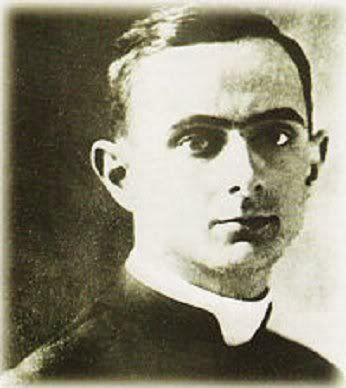 Paul VI as a young priest.
Paul VI as a young priest.
But the thought of being confined to this earth - for man, so immense, but in relation to other stars and space, a mere atom - and seeing above me those thousands of unknown worlds, representing for me beauty and fantastic attarction beyond any other - I felt a vivid desire for happiness that is not mired in the mud of this world. Then I answered myself: "You are (each man is) destined to be a prince in the Kingdom of Heaven."
[Modificato da TERESA BENEDETTA 25/07/2008 19:08] |
 25/07/2008 22:14 25/07/2008 22:14 |
|
| | | OFFLINE | | Post: 14.448 | Registrato il: 28/08/2005
| Utente Gold | |
|

  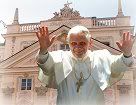 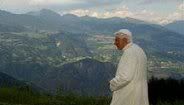
 Hosting the Pope's Summer Vacation, July 28-August 11, 2008
POPE BENEDICT XVI ARRIVES Hosting the Pope's Summer Vacation, July 28-August 11, 2008
POPE BENEDICT XVI ARRIVES
MONDAY IN BRESSANONE
Translated from


July 25, 2008
The Pope will arrive in Bressanone at midday Monday by car, coming from San Giacomo airport in Bolzano, where the Holy Father will be greeted by President Durnwalder of the Alto Adige(South Tyrol) region, the Bishop of Bolzano-Bressanone Mons. Wilhelm Egger, Mayor Spagnolli of Bolzano, a representative of the Italian government and the director of the military airbase.
The Holy Father's motorcade will go through the main streets of Bressanone en route to the Seminario Maggiore where he will be staying from July 28 to August 11 for his annual summer vacation.
"It will be an opportunity for the faithful to welcome the Holy Father without requiring a ticket," said the media coordinator for the diocese.
A welcome ceremony will be held at the square in front of the Seminary, led by Bressanone Mayor Purgstaller, Seminary Rector Ivo Moser, and the dean of Bressanone Cathedral, Fr. Albert Pixner.
The Pope's arrival in the city will be heralded by the municipal band and by a gun salute from Bressanone Alpine Guard (Schuetzen).
The diocese is reminding the public that "Tickets have been almost completely given out for the two Angelus sessions to be presided by the Holy Father on August 3 and August 10 at the city's Cathedral Square (Piazza Duomo).
"In the past few days we have continued to receive thousands of requests. Those concerned should be at Piazza Duomo by 9:30 a.m. to check for places that may still be available."
For those two occasions, Mayor Purgstaller said, "city traffic will be restricted between 5 a.m. to 5 p.m. except for residents. We are confident that arrangements for public transport services will be adequate."
Any possible excursions by the Holy Father during his holiday have been kept top secret. But on the basis of site visits made to possible excursion sites, these may include the Marian shrine at Pietralba, the birthplace of St. Joseph Freinademetz in Alta Badia, the zone of Casere, and the cemetery in Rio Pusteria where the Pope's maternal ancestors are buried.
The only other scheduled event for the Holy Father, besides the two Angelus sessions, are a Mass at the Cathedral on August 6, with all the priests of the diocese, followed by a question-and-answer session such as those that the Pope held in Val D'Aosta in 2005 and 2006, and in the Cadore last summer.
The city has been preparing to welcome Benedict XVI with great enthusiasm. On Monday, when he arrives, all the church bells in the city will ring.
Vatican flags, along with the Italian, have sprouted on balconies and windows. Postcards showing the Pope and the Cathedral have been selling like hotcakes, and bakeries have been making cakes and pastries to mark the Pope's arrival.
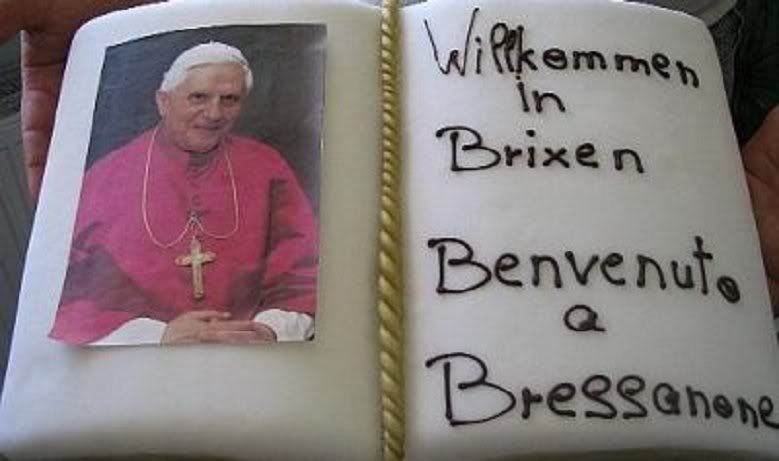
[Modificato da TERESA BENEDETTA 25/07/2008 23:35] |
 25/07/2008 23:54 25/07/2008 23:54 |
|
| | | OFFLINE | | Post: 14.451 | Registrato il: 28/08/2005
| Utente Gold | |
|
  Benedict XVI will visit
Benedict XVI will visit
the Italian President
on October 4

ROME, July 25 (Translated from ASCA) - Pope Benedict XVI will make his second state visit to the President of Italy on October 4, the day Italy celebrates the feast of one of its patron saints, Francis of Assisi.
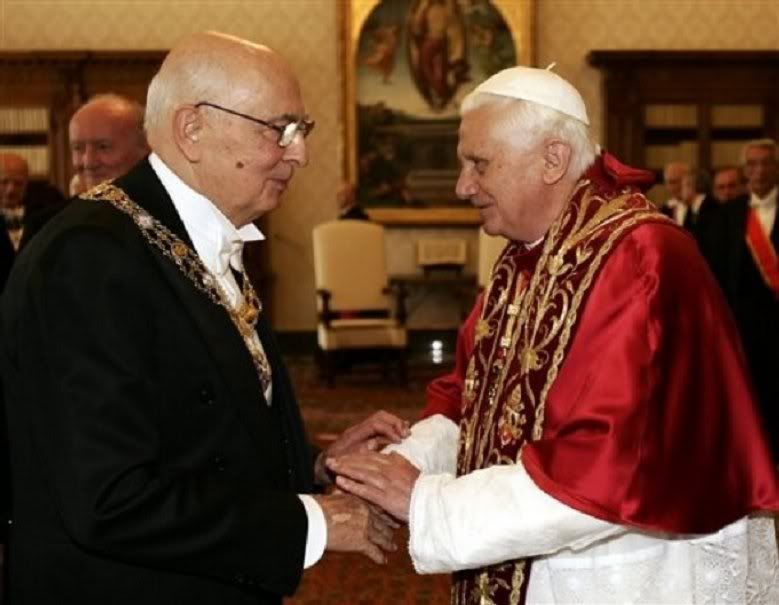
In visiting the President at the Quirinale Palace, the Pope will be returning the visit made to him on November 20, 2006, by Giorgio Napolitano, who was elected the 11th President of the Italian Republic in May 2006.
Previously, the Pope had visited President Carlo Azeglio Ciampi in June 2005.
Napolitano was the first ex-member of the Communist Party to visit a Pope as President of Italy. The only comparable precedent was Massimo D'Alema's visit to John Paul II in 1998 when D'Alema was Prime Minister. In terms of protocol, however, chief of state (Presidwent) outranks head of government (Prime Minister).
POPE WILL VISIT
MADONNA OF POMPEII
DURING BISHOPS SYNOD

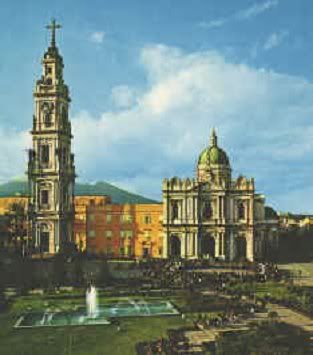 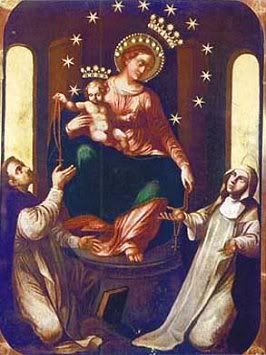 The Madonna of Pompeii is formally known as Our Lady of the Rosary.
The Madonna of Pompeii is formally known as Our Lady of the Rosary.
VATICAN CITY, July 26 (Translated from Apcom) - Benedict XVI will make a pastoral visit to the Marian Shrine at Pompeii on October 19, to preside at a Mass of intercession to Our Lady of Pompeii during the Bishops' Synod.
"We announce with joy and intense emotion that the Holy Father Benedict XVI will make a pastoral visit to the Shrine of the Blessed Virgin of Pompeii," says the letter of Bishop Carlo Liberati, to be read in all the churches of the diocese this weekend.
The letter continues:
"The Holy Father will celebrate Holy Mass during which he will recite the Supplication* and entrust to the intercesion of teh Mother of our Lord the reflections and conclusions of the Bishops' Synod which will take place in the Vatican in October.
"The Holy Father will also commend, in behalf of the bishops of the entire Church, all families everywhere and, together with the Church in Pompeii and the millions upon millions of faithful who recite the Rosary, he will ask the Most Holy Virgin for the unity of families, faithfulness among spouses, and the courage to educate their children in the faith."
* Father Z has the English text of this Supplication, and background about it, on
wdtprs.com/blog/2008/05/8-may-indulgence-supplication-to-ol-of-pompeii-at-...
And there is more about the image of Our Lady of Pompeii and the story of the shrine in THE SAINTS... thread:
freeforumzone.leonardo.it/discussione.aspx?idd=354952&p=11
P.S. L'Osservatore Romano in its July 27 issue confirms the Holy Father's scheduled visit to Pompeii.
[Modificato da TERESA BENEDETTA 27/07/2008 05:01] |
 26/07/2008 15:03 26/07/2008 15:03 |
|
| | | OFFLINE | | Post: 14.457 | Registrato il: 28/08/2005
| Utente Gold | |
|
   Benefan posted this insightful residual from WYD-SYD in the SYDNEY thread, and I thought I ould cross-post it here
Benefan posted this insightful residual from WYD-SYD in the SYDNEY thread, and I thought I ould cross-post it here.
Gen Y's papal connection
by Christopher Pearson

July 26, 2008
SOME World Youth Day pilgrims during the past week have summed up the impact of the event to me by saying that, at least for the time being, they no longer felt as though they were an embattled minority.
Surrounded by hundreds of thousands of like-minded people, the idea that they might be a last, dwindling generation of practising Catholics - as most Australian media tend to portray them - was no longer plausible.
The sociology of knowledge has a term to describe this sense of belonging: Being cognitively entre nous. It's possible to feel quite at home with complete strangers when you know you share a world view and a common ethos.
In an atmosphere of trust, close friendships are more readily formed and high ideals are easier to live up to. Virtuous circles allow people to drop their guard without too much fear of the consequences and to be their best selves.
Last week the Pope assured Sydney's huge crowds that the Church was not old and moribund but, like them, full of youth and vigour. To a wider audience, especially in Australia, this may well have seemed counter-intuitive.
However, from a global perspective it's demographically accurate in the light of the Church's burgeoning growth in the Third World. It also captures the pilgrims' shared sense of participation in a supranational movement with plenty of life left in it, regardless of the bleaker picture painted by local church attendance statistics.
One astute observer of the local scene is Geoffrey Jarrett, the Catholic Bishop of Lismore in northern NSW. He has long been an advocate of regularly taking some of his flock abroad on pilgrimages. The obvious comparison is with the old Left's strategy of building up a cadre.
Whether in groups of 20 senior students or school principals, and to Rome, Jerusalem or the Marian shrines of Mexico, the idea has been to give people a taste of Catholic culture in a place where it is the defining culture of the country.
It's a miniature mirror-image of the WYD experience. Few kids from the NSW north coast are likely to forget in a hurry the experience of sharing a cathedral with 10,000 exuberant Mexicans singing their hearts out or talking to the children and grandchildren of Central American peasants martyred for their faith.
The taken-for-grantedness of belief in such a setting and the universality of the church tend to put Australia's militant secularism and the listlessness that so often characterises parochial life and liturgies into a less oppressive perspective.
Even the hedonism and narcissism that are said to characterise "the lucky country" lose some of their gloss.
Whether in-bound or overseas, there's no doubt that the act of pilgrimage has the capacity to change people's lives suddenly and profoundly. After the success of WYD, the question is whether the church in Australia has the collective resolve and the people to harness the renewed enthusiasm of its young. Will the proverbial seed fall on good soil and put down roots or on stony ground and wither?
When American preacher Billy Graham first toured Australia in 1959, the evangelical churches were thoroughly prepared. Admittedly, Christianity commanded far more widespread respect then and was better organised. Even the least religious-minded products of state schooling were likely to be better grounded in the fundamentals than all but the most assiduously catechised of the under-30s these days.
Mainstream Protestantism saw its chance for a mass revival and made the most of it. Sydney's low-church Anglicans in particular stepped up their lay evangelisation, youth outreach and regular teaching programs, and have never really looked back.
Australian Catholicism is deeply divided on any number of theological and ideological fault lines and teetering on the brink of institutional collapse in Queensland and Tasmania. Yet the Pope remains a powerful symbol of unity within the universal church and attracts far more loyalty and affection from young Australians than any local prelate or ecclesiastical faction.
Can the bishops' conference rise to the occasion and speak with one voice to the generation on whom its future largely depends? While there's no accounting for providence, the odds are against it.
What seems likelier is that the dioceses that are prepared to follow Benedict XVI's lead, as witnessed in his preaching, teaching and liturgical example, will be able to provide the most convincing segues from the highlights of the past few weeks back to everyday life in the parishes. Elsewhere the mismatch will be a source of confusion and, for many, discouragement.
WYD in Sydney differed from previous events in several important ways. The added emphasis on catechesis, with teaching sessions from some of the world's ablest theologians and the Pope, was striking.
Not many Australian Catholic clergy are especially well-versed in theology and some are vehemently anti-intellectual. The people in the pews have seldom had much access to sustained exposition of the faith unless they took some sort of formal course in theology or church history. Too few of those who were capable of teaching them went out of their way to make the laity welcome in their classes.
Even in the recent past, in many dioceses lay people with an intellectual interest in religion have tended to be regarded as eccentric god-botherers or seen as a potentially competing source of authority to the clergy.
For all that, the Pope was a theology professor and he clearly believes that many people apart from the clergy can benefit from studying it. He sees learning as a powerful bulwark of faith rather than a likely stumbling block, a view many eager gen Y Catholics share. The best of them won't take no for an answer and if the bishops have any sense at all they'll accommodate them gladly.
As with teaching, so also with preaching. During the past 40 years or so, the diocesan seminaries seem to have thought that instruction on preparing sermons was a relatively unimportant element of priestly formation. As a result, few Catholics in this country any longer expect well-considered, thought-provoking sermons.
The visibly mesmerising effect of the Pope's preaching on so many of his listeners during his stay here attests to the novelty of the experience.
As has often been noted in the past fortnight, Benedict does his level best to encapsulate complex ideas and the mysteries of the faith in simple language and suggestive analogies. By the same token, he doesn't talk down to his audience or shy away from difficult subject matter.
He expects people to try to understand him and to go back and re-read what he has said if necessary and ponder it. He's not afraid to make demands on young people's attention and to take them out of their comfort zone. My guess is that most of them like him all the more for it and will reward the bishops and clergy who take a leaf out of his book.
Another feature of WYD Sydney, especially in contrast to Toronto, was the marked improvement in the quality and performance of most of the music and the high church forms of the liturgy.
It was all of a piece with the greater use than hitherto of sacramental confession on the Saturday evening at Randwick and the reverent silences during Eucharistic adoration and benediction. Twelve years ago those practices were as unfamiliar to most WYD pilgrims as they still are to most behind-the-times Australian Catholics.
Letters to the editor by baby boomer grandparents notwithstanding, this generation is not put out by Mozart, Gregorian chant or Latin prayers. If, like many of their forebears, some of them smoked a bit of marijuana during the sleepover, like an earlier generation they seemed to enjoy a bit of incense and the Aboriginal smoking ceremonies, too. Judging by their respectful behaviour, solemn ritual is taken as a given and doesn't offend them.
Individually, they may be by temperament a rather democratically minded lot, but they don't seem in the least bit flummoxed by the primacy of the successor of Peter or the kind of sovereignty he exercises.
 Perhaps Mr. Pearson might wish to update his terminology from 'Gen-Y' to 'Gen-Ben' which began to gain currency back in Cologne 2005!
Perhaps Mr. Pearson might wish to update his terminology from 'Gen-Y' to 'Gen-Ben' which began to gain currency back in Cologne 2005!
|
 27/07/2008 04:11 27/07/2008 04:11 |
|
| | | OFFLINE | | Post: 14.463 | Registrato il: 28/08/2005
| Utente Gold | |
|
   The Pope's visit to Australia:
The Pope's visit to Australia:
When the media overcome their prejudices
by Stefano Girola
University of Queensland (Australia)
Translated from
the 7/27/08 issue of

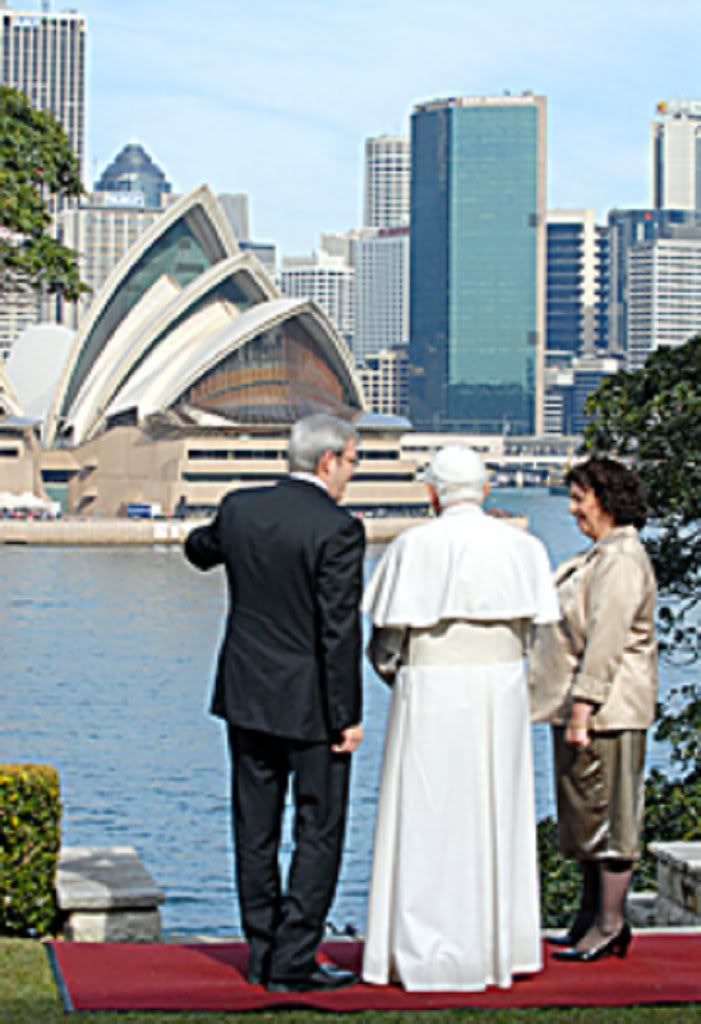
When several years ago, Italian immigrants started celebrating the feasts of their patron saints on the streets of Australian cities, the annoyance it caused in some sectors of local society had a precise cause: by their public manifestations of popular religiousness, the Italians challenged - in a most theatrical way - the consolidated separation between the sacred and the profane that is so rooted in the Australian mentality which would relegate religion to the strictly private sphere.
The persistence of this mentality also explains the hostility against World Youth Day that was evident in most of the Australian media in the weeks which preceded the event.
One of the most important national newspapers, the Sydney Morning Herald, repeatedly criticized the financial support offered by the government of New South Wales to the Archdiocese of Sydney, and predicted catastrophic traffic nightmares and serious problems of public order during the event.
Beyond this, for some media, their only interest in WYD was whether the Pope would apologize for sexual offenses committed by some members of the Australian clergy in the same way that he did when he was in the United States.
The insistence on this subject peaked on the screens of the country's main public TV outlet, the Australian Broadcasting Corporation, when, a few days before the arrival of the Pope, its newscasts and its evening public affairs program Lateline dusted off the case of sexual molestations committed 25 years ago by a priest on a man who was 29 years old at the time, and demanded the resignation of Cardinal George Pell who had a hand in dealing with the case in 2003.
The case - which was far from abusing a minor - has since been deflated to its proper proportion, but that ABC had led a campaign to try and get Pell to resign on the very eve of WYD says a lot about the present attitude by some in the Australian media against the Catholic Church.
After WYD, however, the prevalent tone in the Australian media was very positive - in part because all the doomsday predictions proved wrong, and in part because Benedict XVI did issue a strong condemnation of priestly abuses.
In an article in thee Jesuit publication Eureka Street, Andrew Hamilton commented: "The apology made by the Pope, with its emphasis on justice and compassion, offered exemplary leadership. If Australian Catholics would speak and act according to these words, then the media may gradually stop looking at the Catholic Church only through the lens of sexual abuses by the clergy."
The daily newspaper The Australian welcomed the Pope's expression of pain and solidarity with the victims in his homily at St. Mary's Cathedral. In an editorial on July 21, the newspaper called WYD "one of the great successes of the early 21st century: well-organized, safe, and happy".
For The Australian, WYD sealed the maturity reached by the Australian Church, expressed symbolically in this comparison: "And while Australia remains young in terms of Christian heritage, the Stations of the Cross at the city's most striking sights made as moving and intense a religious experience as any centuries-old shrine in Europe."
Even the fact that WYD showed the aboriginal aspects of Australian art and culture was seen as one of its merits by the editorial which concluded: "It will be a long, long time before Australia will see another week like that of World Youth Day."
Citing the data from a survey by the Galaxy society, the Daily Telegraph's Brooke Newstead and Kate Sikora wrote: "It's now official. Sydney loved World Youth Day. After grumbling before the event, most Sydneysiders changed their tune, thinking it great for Sydney."
According to the survey, 71% of those interviewed considered the massive influx of pilgrims into Sydney as positive.
Neil Ormerod, professor of theology at the Australian Catholic University, told the Herald Sun that the 'triumphal' outcome of WYD had surpassed even the most optimistic projections: "Notwithstanding my own fears, the organization and execution of WYD were excellent. The event has generated a lot of good will and positive sentiments on the part of the youth towards the Church and its leadership. But only time will tell if all this will translate into a lasting change in attitudes towards the Church."
Some comments suggest that the attention inspired by WYD and Benedict XVI's visit will impel the Church in Australia to situate itself differently with respect to the rest of Australian society.
On July 22, Catherine Smibert reported on www.catholic.org some words said by Cardinal Pell after the Pope had left: "Perhaps in the past, we Catholics were too interested only in ourselves. Now we can say clearly that we have something to offer to the rest of the Australian people."
Even for Tony Abbott, a former Minister of Health and a practising Catholic, WYD could represent a turning point for the Australian Church, which has been traditionally accused of hardly having a social conscience and being too occupied with internal Church problems.
In an article for The Australian on July Abbott wrote: "For a few days Catholics emerged from the mental ghetto into which many had retreated and we are unlikely to be as defensive or as unobtrusive again".
Abbott saw in WYD the occasion to review the attitudes of the media towards religion:
"If good news about religion can dominate front pages for a whole week, perhaps media organisations may reconsider their almost universal abolition of religion correspondents and end the condescension with which it is invariably treated.
"At least for a week, Australians seem to have accepted that curiosity about God is 'etched on our souls' as Benedict XVI has put it. For a week, religion has been associated with bringing out the best rather than the worst in people. "
That such a rethinking has started might be suggested in a July 21 editorial in the Sydney Morning Herald, so different in tone from many articles published in the newspaper before and during WYD.
According to the editorial writer, "During this last week, Sydney - which is probably the most materialistic and worldly Australian city, was transformed into a pilgrimage site... WYD is obviously a Catholic festival, but thanks to its dimensions, it has touched the entire community, and in its turn, the community has embraced WYD."
Finally, according to this editorial, WYD showed a different image of Benedict XVI, a Pope who has offered the local Church a historical opportunity for renewal: "Benedict XVI came to the papacy with a reputation as a conservative scholar. WYD 2008 in Sydney showed that he has mellowed in his role: to his young followers, he seemed open and expansive, and they responded with genuine affection. His apologies for sexual abuses by the clergy seemed to be yet another expression of his growing capacity to reach and touch the hearts of believers. His words offer the Catholic Church in Australia an opportunity for a new beginning on this difficult question."
Yes, but I wish Prof. Girola would not simply accept uncritically the editorial's words implying that the Holy Father is just learning to connect. Just because some in the media may start to look at Benedict XVI more positively does not mean they should be excused for choosing to ignore all the facts about him earlier so they could persist in their willfully blind prejudices!
 For secular Australia,
For secular Australia,
World Youth Day was wake-up call
By Anthony Barich

SYDNEY, Australia (CNS) -- In what is often seen as one of the most intensely secular nations in the world, Australia received a wake-up call: the faith of the church on public display over the weeklong celebrations of World Youth Day.
For young Catholics used to seeing a steady annual decline in figures such as Mass attendance -- now estimated at approximately 13 percent of Catholics nationally -- and feeling like the only young person in the local parish, the sight of an estimated 300,000 pilgrims from around the nation and overseas may well have provided a much-needed shot in the arm.
Prominent Australian theologian Tracey Rowland, dean of studies at the John Paul II Institute for Marriage and Family in Melbourne, Australia, said the July 15-20 World Youth Day activities and the visit of Pope Benedict XVI will not fix Australia overnight.
"But Pope Benedict's weeklong 'Christianity 101' intensive course for a couple of hundred thousand Australian pilgrims will certainly improve the situation, especially for Generation Y," she said, referring to the young people.
She noted that for many young pilgrims, World Youth Day was their first experience of solemn liturgy, adoration before the Blessed Sacrament, receiving catechesis with deep intellectual and spiritual content, and meeting numerous other young people not embarrassed to be identified as Catholics.
The Pope's homilies were deeply Christocentric, and in the closing Mass he explained the meaning of the Angelus -- which he recited in Latin -- as God's marriage proposal to humanity, accepted on people's behalf by Mary.
"No one could go away from Sydney thinking that it is possible to compartmentalize the faith or reduce it to a few rules and regulations and Sunday observances," Rowland said.
"The Pope constantly reiterated the theme that it is all about a personal participation in the life of the Trinity and that changes everything," she said. "There is no room for secular spheres impervious to the sacred and divisions between public and private personas; there is only a part of us and a part of our culture that either belongs to Christ already or still awaits transformation.
"That task of transformation is the biggest adventure life in the world can offer us, and some half a million pilgrims got a taste of it at World Youth Day," she said.
Sydney Auxiliary Bishop Anthony Fisher, chief organizer of World Youth Day, said that in his series of homilies during the weeklong event, the Pope gave young Australian Catholics a blueprint of how to change the social and spiritual fabric of the country that the pope dubbed the "Great South Land of the Holy Spirit."
Pope Benedict addressed relativism and apathy during his homilies and emphasized the importance of unity and hope.
"He's provided us with a program for the spiritual and social renewal of our country and has offered young people the encouragement and inspiration to do that," Bishop Fisher said.
"Young people will return to their parishes, schools, communities and universities with a passion. All of us have been shown that Australians can be more idealistic and passionate about what really matters.
"We would hope that there's going to be a new life and energy in every corner of the church, especially youth ministry, which will obviously be bigger and better as a result of World Youth Day," he added.
Bishop Fisher acknowledged Pope Benedict's concern for how deeply secularization has set into Australia.
"When (the Pope) is talking about things like apathy and relativism, they're commonplace in the Western world, but certainly I think he had Australia in mind, and it's a real issue for us right across the board, not just for the church," Bishop Fisher said.
"People are at times apathetic about key issues in the world, and Australians in particular are very comfortable -- we've got a pretty good life.
"But the risk is that if we don't then ask the bigger questions ... what it's all for, and what about the poor people of the world who don't have the affluence we have, even in our own community? The indigenous Australians have been so prominent during WYD ... how do they fit into the new wealth of Australia and the comfort?" he asked.
The challenge was clearly set out by Archbishop Charles J. Chaput of Denver, who told more than 1,000 youths at a Theology on Tap session at an Irish pub in Sydney about the futility of living a double life -- going to Mass on Sunday but not giving public witness to the faith.
"We can't live a halfway Christianity," he said. "Every double life will inevitably self-destruct. Being a Christian is who you are -- period. And being a Christian means your life has a mission. It means striving every day to become more like Jesus in your thoughts and actions."
The focus of the catechesis, held over the first four mornings of World Youth Day in 250 locations across Sydney and taught by bishops from around the world, was carrying out the church's mission empowered by the Holy Spirit.
World Youth Day has been the seed of many vocations, be it to married, religious or single life. Amid the hype and noise of the multicultural week, bishops and lay leaders alike warned pilgrims that unless they took time for silent meditation and prayer, then the fruits of World Youth Day might be lost.
After celebrating Mass at the University of Notre Dame Australia, Bishop Joseph A. Pepe of Las Vegas said quiet reflection is essential "so God can whisper to you and give you your vocation" -- as the pope reminded young people in his visit to the United States three months before World Youth Day.
"If we have the environment of prayer, then we're communicating with God, and God will communicate with us, telling us if we will have vocations in our families," Bishop Pepe said.
Bishop Fisher said he felt optimistic after World Youth Day.
"We often talk of Australia being a secular country, as if the view that religion has to be privatized or abolished has won," he said.
"We know in fact that most people still say, when asked, that they believe in God and they pray sometimes and say they are Christians. So Australia isn't as agnostic as it's portrayed," he said.
[Modificato da TERESA BENEDETTA 27/07/2008 05:46] |
 27/07/2008 05:54 27/07/2008 05:54 |
|
| | | OFFLINE | | Post: 14.464 | Registrato il: 28/08/2005
| Utente Gold | |
|
   'It's not easy being green,'
'It's not easy being green,'
but it's part of God's plan, says Pope
By Cindy Wooden

VATICAN CITY, July 25 (CNS) -- Visiting Australia in July gave Pope Benedict XVI an opportunity to develop further his creation morality, which he first explained in the northern Italian Alps a year ago.
While Pope John Paul II was the outdoorsman, Pope Benedict's three-year pontificate already is seen as the green papacy.
Accepting donations of solar panels and a reforestation project to offset the Vatican's carbon footprint, the 81-year-old Pope has shown his concern for the environment is concrete.
But his July 12-21 trip to Australia also gave him an opportunity to demonstrate that his concern is theologically based, part of a broad moral code and is perhaps the best way to convince young people that there is such a thing as natural law -- that some actions are naturally always right or wrong.
Meeting priests in the Alps last year, the Pope suggested that affirming young people's sensitivity to environmental concerns was the first step in showing them that they really believe God created all things and that God's plan for creation must be respected.
The next step, he said last year, was to explain that "we must not only care for the earth, but we must respect one another."
"Only with absolute respect for this creature of God, this image of God which is man, only with respect for living together on this earth can we move forward," the Pope told the priests.
For Pope Benedict, the obligation to safeguard the environment flows from recognizing that God has a plan for creation as a whole and for all its components: air, water, mountains, forests, flora, fauna and -- especially -- human beings.
In Sydney for World Youth Day, the Pope had an opportunity to explain to Catholic young people how it all fits together.
"God's creation is good and it is one," he said at the July 17 welcoming ceremony.
"The concerns for nonviolence, sustainable development, justice and peace and care for our environment are of vital importance for humanity," he said. "They cannot, however, be understood apart from a profound reflection upon the innate dignity of every human life from conception to natural death: a dignity conferred by God himself."
The earth and all it holds was created to sustain human life, he said, but neglect, greed and shortsightedness have led to the poisoning of air, water and soil and the destruction of the forests.
In a similar way, the Pope said, people were created in God's image and likeness and destined to seek truth, beauty and goodness.
But in the human environment, as in the rest of nature, there exists "a poison which threatens to corrode what is good, reshape who we are and distort the purpose for which we have been created," he said.
Alcohol and drug abuse, violence, sexual degradation, abortion and other attacks on human life are all signs of how people ignore their own dignity or the dignity of others as the crown of God's creation, the pope said.
And, he told the young people, relativism -- thinking that there do not exist any absolute truths -- is one of the clearest signs of a waning recognition that God is the creator of all things and all people.
Under the guise of being "neutral, impartial and inclusive of everyone," relativism actually claims God's place and denies that there is any such thing as natural order, natural purpose and natural goodness, he said.
The world is fragile, the Pope told them, and harm done in one area affects another.
"We have become more and more aware of our need for humility before the delicate complexity of God's world," he said.
The Pope's message to the young people was that like the stars and the seas, the flowers and the cattle, "your very existence has been willed by God, blessed and given a purpose."
  Getting tickets for
Getting tickets for
an audience with the Pope
Posted on July 24, 2008 by Carol Glatz

VATICAN CITY (CNS) — The Vatican has just made it a bit easier for folks looking to come to Rome to attend one of the Pope’s weekly general audiences or liturgical ceremonies.
Just a few weeks ago, the Prefecture of the Papal Household revamped its Web site giving people the information and the official form they need to request the free tickets.
Previously people had to call the prefecture to learn how the procedure worked. Now they can just go to the Web site,
www.vatican.va/various/prefettura/en/biglietti_en.html
download the request form, and send it in by post or fax.
An official at the prefecture told me this morning that ever since they changed the Web site and made more information available online, the number of calls coming in for general information “have dropped” substantially and requests coming in by fax “have gone up a lot.”
They’ve also added a calendar of the Pope’s schedule — when Pope Benedict is or isn’t holding a general audience — so pilgrims don’t request tickets on a day the Pope is on vacation or out of town.
The new changes don’t include being able to send requests by e-mail; so far only the U.S. Bishops’ Office for United States Visitors to the Vatican and the American Church of Santa Susanna offer that option.
And don’t forget: the same dress code applies to papal audiences as with the Vatican Museums and St. Peter’s Basilica — wearing tank tops, spaghetti straps, and short shorts are a no-no.
[Modificato da TERESA BENEDETTA 27/07/2008 05:58] |
 27/07/2008 15:11 27/07/2008 15:11 |
|
| | | OFFLINE | | Post: 14.469 | Registrato il: 28/08/2005
| Utente Gold | |
|
     Don't forget you can always see the latest videoclips on the Holy Father here:
www.radiovaticana.org/it1/videonews_ita.asp
ANGELUS TODAY
A translation of the Holy Father's words has been posted in
Don't forget you can always see the latest videoclips on the Holy Father here:
www.radiovaticana.org/it1/videonews_ita.asp
ANGELUS TODAY
A translation of the Holy Father's words has been posted in AUDIENCE & ANGELUS TEXTS.
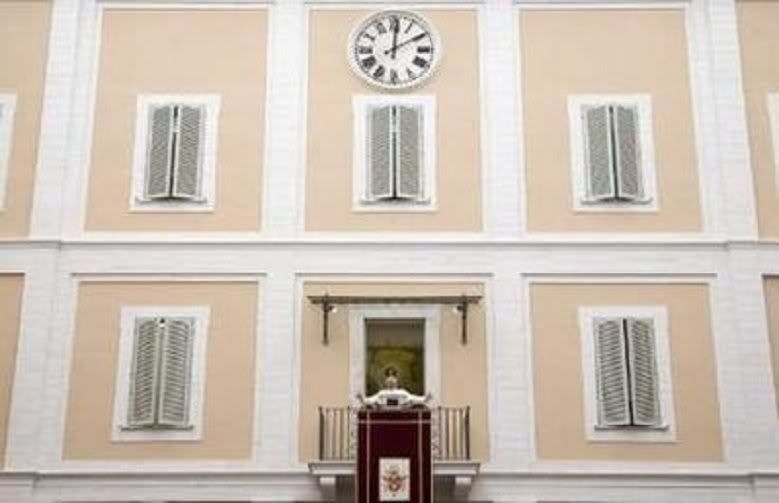
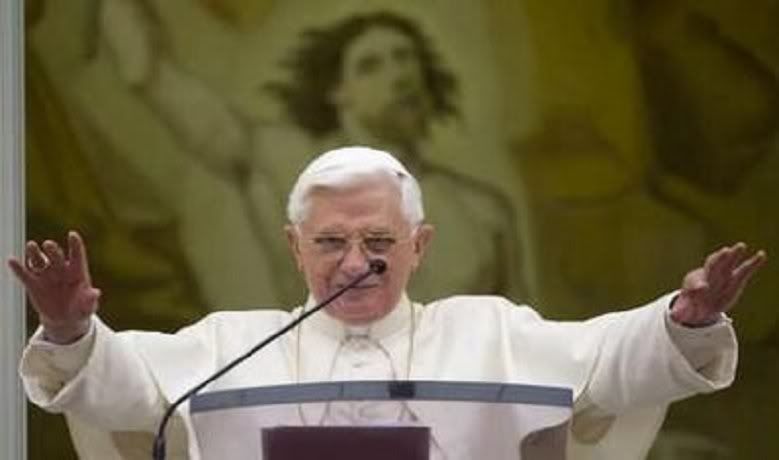
The Holy Father devoted his message today to reporting on his apostolic trip to Sydney for World Youth Day. He thanked Cardinal Pell and the Church in Australia, as well as Australian authorities, for their preparations and efforts in behalf of all the pilgrims as well as himself.
In English, he said:
I greet the English-speaking visitors and pilgrims who are here today and I wish you all a pleasant stay in Italy. This Sunday’s Gospel reminds us that we should treasure above all else the faith that has been given to us. I pray that your visit to Rome and the surrounding area will help you to deepen your faith and to grow in your love for our Lord Jesus Christ. May God bless you all!
In Italian, he greeted the members of the Focolari movement who are holding an annual conference and congratulated them on their new leadership, following the death of their beloved founder, Chiara Lubich.
He also greeted the delegation of the city and parish of Castel Gandolfo who visited him today on the occasion of the traditional annual festival of peaches.
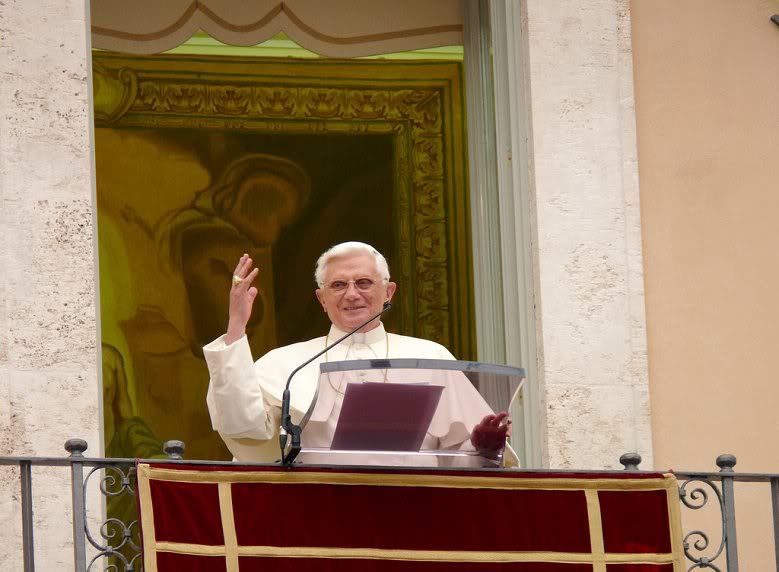
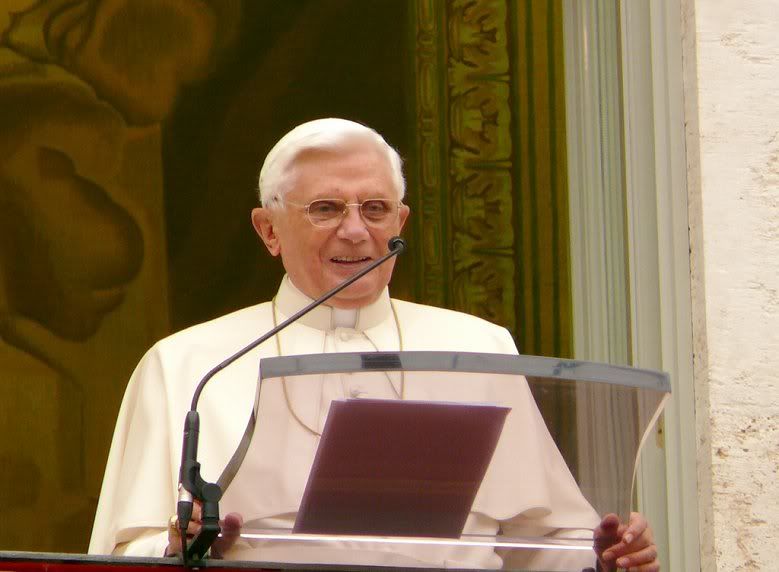
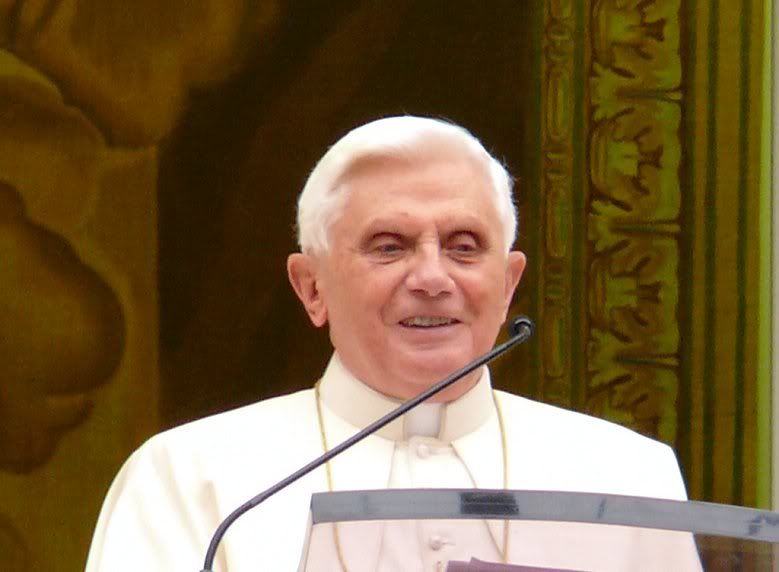 Pope says
Pope says
'Australia was extraordinary'

CASTEL GANDOLFO, Juyl 27 (AFP) - Pope Benedict has described his trip to Australia for World Youth Day as "an extraordinary experience" which demonstrated the youthful face of the Catholic Church.
Speaking before the weekly Angelus prayer at his summer residence outside Rome, he paid tribute to "the multicoloured mosaic created by the boys and girls from every part of the earth, all reunited by one faith in Jesus Christ".
"I still have in my eyes and in my heart this extraordinary experience, in which I was able to meet the youthful face of the church," the Pope said.
He thanked the church and civil authorities in Australia for their co-operation in organising World Youth Day, which brings together young Catholics from across the world every two or three years.
Hundreds of thousands of people, including about 135,000 young people, attended a Mass last Sunday marking the end of the events in Sydney, and the Pope, in Australia since July 12, returned home on Monday.
The next World Youth Day will be held in Madrid in 2011.
The Pope also announced he would be going on holiday to Bressanone in northern Italy tomorrow. He will stay there until next month before returning to Castel Gandolfo and beginning preparations for a September trip to France. [Before that, he will be making a pastoral visit to Cagliari, capital of Sardinia, on Sept. 1.]
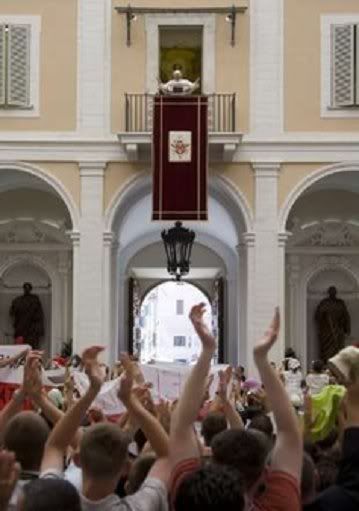 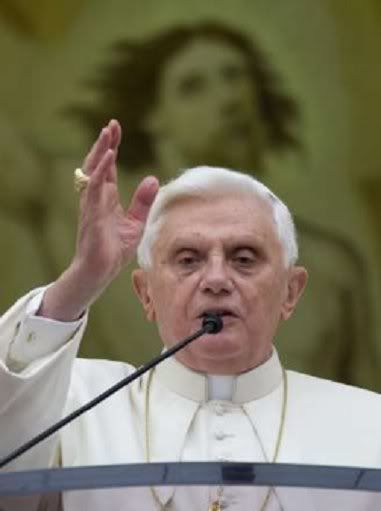
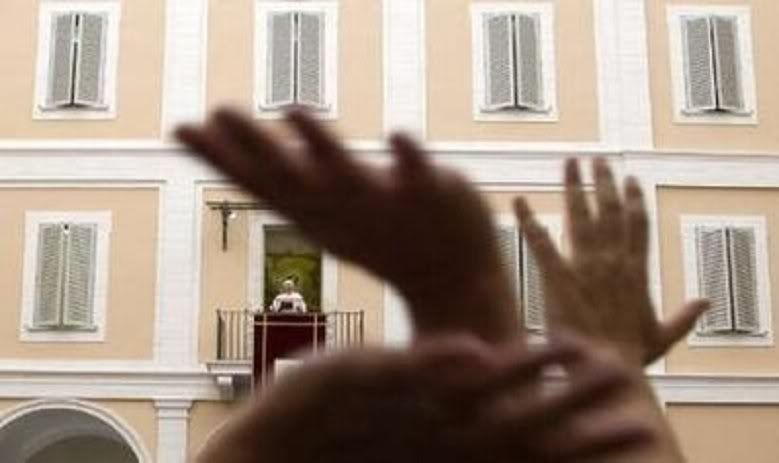
[Modificato da TERESA BENEDETTA 28/07/2008 16:25] |
 27/07/2008 20:04 27/07/2008 20:04 |
|
| | | OFFLINE | | Post: 14.471 | Registrato il: 28/08/2005
| Utente Gold | |
|

   
 Hosting the Pope's Summer Vacation, July 28-August 11, 2008
THE HOLY FATHER BEGINS Hosting the Pope's Summer Vacation, July 28-August 11, 2008
THE HOLY FATHER BEGINS
A TWO-WEEK VACATION TOMORROW
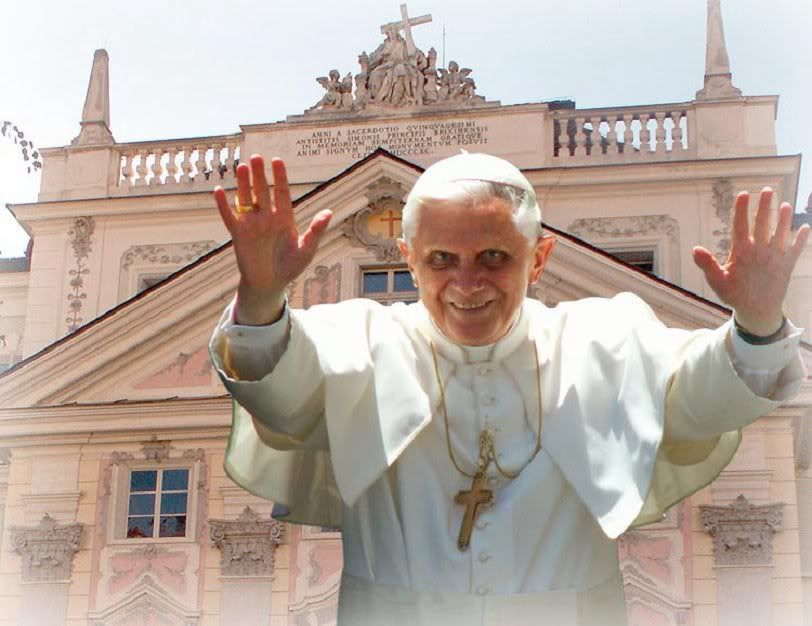 For the Pope: Two weeks
For the Pope: Two weeks
of prayer, study and rest
in Bressanone
by Nicola Gori
Translated from
the ... issue of

Almost a homecoming, to be welcomed by friends who await him like a member of the family, Benedict XVI will spend his summer vacation in an informal, familial atmosphere.
He will be arriving there tomorrow Monday, July 28, and will stay till Monday, August 11.
One might say that Papa Ratzinger is a habitue of Bressanone/Brixen in the Alto Adige/South Tyrol [to give the bilingual places their habitual Italian/German names].
As Cardinal Ratzinger, he spent ten summer vacations in Bressanone, at the Seminario Maggiore, where he always occupied the same room. He was such a familiar guest that, knowing his preferences well, he was given his own key to the seminary's famous baroque library.
The city and the diocese are ready to provide the Holy Father with two weeks of tranquillity and rest. For this purpose, planned renovation and restoration work at the Seminary, a half-century due, was advanced to be in time for his visit.
L'Osservatore Romano spoke to Mons. Wilhelm Emil Egger, bishop of Bolzano-Bressanone/Bozen-Brixen, who has headed the preparatory work.
 Monsignor, how did the local people react to the Pope's decision to spend this summer vacation in Bressanone?
Monsignor, how did the local people react to the Pope's decision to spend this summer vacation in Bressanone?
They have actually been wanting this visit for some time, and now their desire has been realized. They feel greatly honored because they feel that the Pope's decision is an expression of his esteem for the place and for us - both for the quality of life in the city, and for the nature of the region itself, which is a favorite vacation site for many. It is a tourist region, so to speak, so we are very happy that the Pope has chosen to be with us.
How have you prepared so that the Pope can truly have a period of rest here?
Since the Pope has been here many times before, we think he will find the place familiar to him. But we have renovated the so-called bishop's apartment, which he will occupy, as well as other parts of the seminary that had been scheduled for renovation soon.
The Cusanus, a training academy next door to the seminary, will be closed for the duration of the Pope's vacation, to make the place more private for him. What is most important for us is to guarantee his tranquillity.
We had programmed only three public events for him - the two Sunday Angelus prayers and the Mass and meeting with the priests of the diocese. These required special preparation. We have a beautiful Cathedral Square which can accommodate 9,000 persons for the Angelus.
My people have also made on-site visits to places in and around the city which the Pope may visit if he so desires.
Given the extraordinary natural setting of this place, do you see this vacation as another opportunity for the Pope to say something about the environment?
As you know, the Pope spoke about the subject even while he was in Australia. His presence with us is yet another message itself about the beauty of creation. The Pope loves natural settings. His presence amid such beauty - for rest, tranquillity and silence - is an optimal message about relaxing from stress by enjoying the beauty of God's creation.
What would a typical day be like during the Pope's vacation?
I couldn't say, but we know how he spent his vacations here as a cardinal, and I think he will follow the same pattern. There will be periods for prayer, and of being together with his brother Georg, who will be arriving Tuesday to join him.
He will listen to music a lot. We have placed a piano for him in his apartment, as we are sure he will want to play music himself.
He will have all the time and space for reading and study. As a visiting cardinal, he had his own key so that he could enter the library whenever he wanted. It is a historical library of great value, but its contemporary collection of books is equally very good, and the Pope knows this.
And certainly he will be taking walks in the garden or by the river. But all this will not take him away from thinking about his pastoral and magisterial ministry. We know that he has used his previous vacations here to undertake or begin many important works, such as the interview with Vittorio Messori that led to the book Rapporto sulla Fede. And he has revealed that he wrote the first four chapters of JESUS OF NAZARETH when he was here in August 2004.
The surrounding atmosphere, the fact that he is free of his daily public commitments, and the tranquillity we hope to assure him during his stay are elements that are favorable to study, reflection and prayer.
Has the city planned anything special for him?
First of all, it has 'prettied up' itself. Not the least, for instance, they have repaired the pavement and filed up the holes in the square in front of the seminary. That is where the first meeting will take place between the Pope and the citizenry - at the end of the motorcade through the main streets when he comes in from the airport in Bolzano.
The municipal band and children will welcome him there as in a homecoming. During the two weeks, there are several cultural initiatives including concerts and a special photographic exhibit on the consecrated life.
The 12th General Assembly of the Bishops Synod will take place at the Vatican in a few months on the theme "the Word of God in the life and mission of the Church". Last January, the Pope named you to be its secretary-general. Will you be discussing this with the Pope?
As I am committed above all to guarantee the Pope's rest, this applies first of all to me personally. I would not bring up the subject, unless he does.
I have known the Pope for a long time, and he knows me just as well. He knows I am a specialist in the Scriptures. And as he is a great expert on the Bible himself, it would be very interesting to converse with him on these things.
He wrote a very beautiful commentary on the Conciliar Constitution on Revelation, Dei Verbum. And when he was Prefect of the Congregation for the Doctrine of the Faith, he worked on and published a document on the interpretation of the Bible in the Church.
So yes, there could be a lot to talk about, but that's not what he's coming here for.
Public opinion has also shown interest in the economic aspects of the visit. What do you say to this?
We are a very hospitable people. The government has spent on many initiatives to promote tourism and has supported events like important football tournaments. Of course, even for the visit of the Pope, there have been public expenses - and these are shared by the diocese, by certain public institutions of the city and of the province, and by donations from private sponsors. As for the renovations in the seminary, I already pointed out that these had been programmed to take place sooner or later.
 The Pope will be made
The Pope will be made
an honorary citizen
of Bressanone
A fourth public event has been added to the Pope's program in Bressanone. On Saturday, August 9, the city of Bressanone will grant him honorary citizenship at a ceremony to be held in the town hall.
The Pope will leave Castel Gandolfo at 10 a.m. tomorrow, July 28, for Ciampino airport in Rome, to take the flight to Bolzano.
He is expected to arrive at the Bolzano airport around 11:15 a.m. where he will be welcomed by regional and city officials and Bishop Wilhelm Egger.
He will then travel by car to Bressanone, where his motorcade will pass through the main streets of the city. There will be a brief welcome ceremony at the square in front of the Seminario Maggiore where he will be staying.
After that, he will appear at the window of the Seminary library to impart his blessing to the people.
His other public engagements in Bressanone include the two Angelus prayers at Cathedral Square on August 3 and 10, and the Mass and meeting with priests of the Diocese in the Bressanone Cathedral on August 6.

NB: The city of Bressanone/Brixen has opened a special site in Italian and in German on the Holy Father's visit:
  papst.brixen.it/
papst.brixen.it/
in addition to the bilingual site dedicated to the visit by the Diocese:
ecclesiabz.com/
[Modificato da TERESA BENEDETTA 28/07/2008 19:30] |
|
|
|
|